Brexit Watch: At-a-glance day-by-day summer briefing
- Published
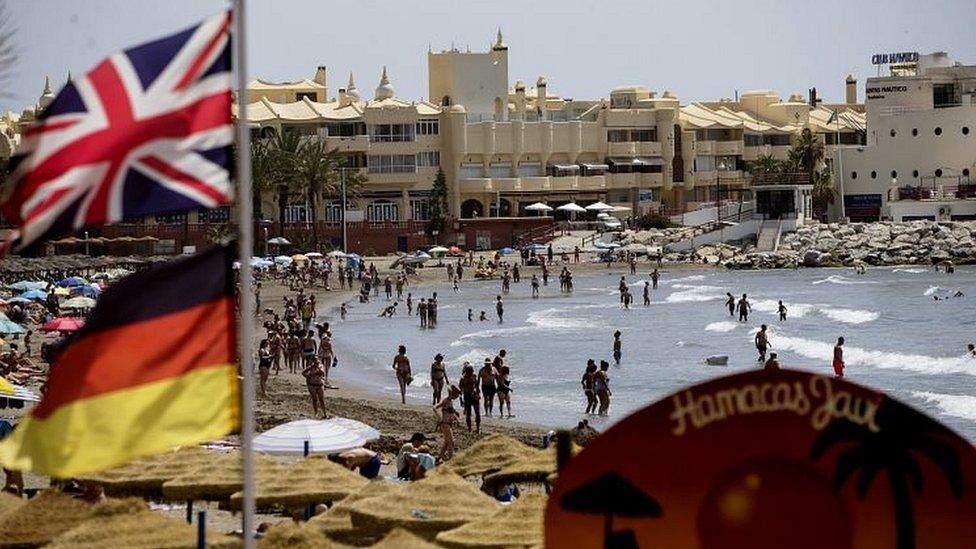
The UK voted to leave the European Union in a referendum on 23 June. Here's your daily summer briefing of the latest Brexit-related news...
Recap for new readers
The UK public voted 52% to 48% to leave the European Union in June's referendum. During the campaign there were warnings from the Remain side about the economic impact of leaving, while the Leave side suggested the UK would be able to take back control of immigration and the £350m a week they said the UK sent to the EU. New Prime Minister Theresa May has said "Brexit means Brexit" - but no-one yet seems too sure what Brexit means. Will the UK stay as a member of the EU single market? Will EU nationals retain the right to live and work in the UK? What economic impact has the Brexit vote had?
Thursday 1 September
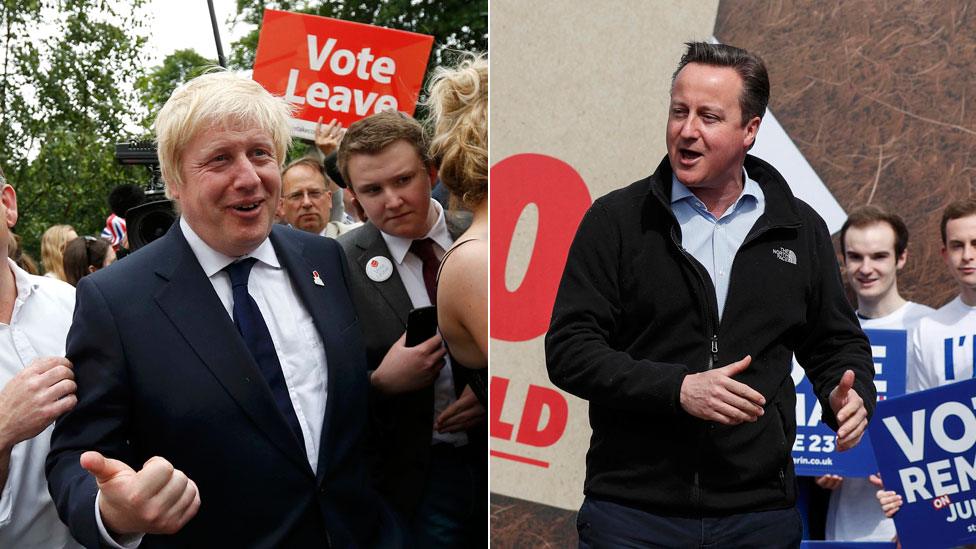
The main event: A report published by the Electoral Reform Society in to the EU referendum says the campaign was dogged by "glaring democratic deficiencies" with voters turned off by big name politicians and negative campaigning. The group, which campaigns for electoral reform, was critical of both Remain and Leave, saying people felt "ill-informed" by the "dire" debate and it said the impact of political leaders had been "minimal". It wants a "root and branch" review of the way referendums are run, and has proposed a "rule book" to govern campaigns' conduct, a public body to intervene when "misleading" claims are made and a review of broadcasters' role. A government spokeswoman said the referendum result was decisive "with one of the highest turnouts of any vote seen in a UK-wide poll in a generation". A spokesman for the elections watchdog, the Electoral Commission, said it would consider the report's proposals. Its own report is due to be published later this month, with recommendations for "improving the conduct and regulation of future referendums".
Also in the news: PM Theresa May has said Britain's exit from the EU will open up new markets and opportunities around the world for British businesses. She said she was determined to "make the most of the opportunities" resulting from the Brexit vote. The prime minister was speaking ahead of the weekend's G20 summit of leading global economies in China, where she will tell fellow leaders the UK is "open for business". European Council President Donald Tusk has said the EU's remaining 27 member states will need to come up with "a common diagnosis" of the EU following the UK's decision to leave. He stressed it was not going to be their intention to talk about the UK at the forthcoming meeting of EU leaders in Bratislava or their negotiation strategy regarding the UK. He said this was to "protect the interests of the members of the Union that want to stay together, and not the one which decides to leave". And one of Mrs May's predecessors, former Labour PM Tony Blair, has said it is possible that Brexit may never happen if public opinion turns against it. While he conceded such an outcome was unlikely, he told French radio station Europe 1: "Who made the rule that we have to stop the debate now?"
Financial news: The pound has jumped to a one-month high against the dollar after a survey indicated the UK's manufacturing sector rebounded sharply in August. The Markit/CIPS purchasing managers' index (PMI) for the sector rose to 53.3 in August from July's figure of 48.3. A figure above 50 indicates expansion. The weakening of the pound following the Brexit vote boosted exports, according to the survey, but it also indicated that the weak pound had pushed up firms' costs. Meanwhile, recruitment giant Hays has said the UK job market weakened "significantly" around the time of the EU referendum, but it is too early to judge the long-term impact of the vote. The company also said it had seen "no evidence" of any impact of the vote in markets outside the UK.
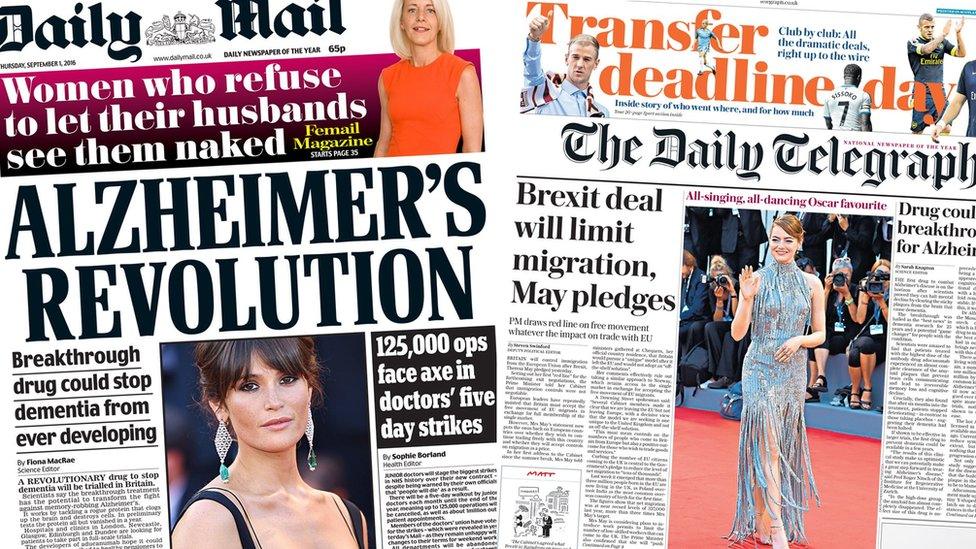
From the papers: The UK's early moves towards EU exit make a lot of today's front pages, following Theresa May's "Brexit brainstorm" with cabinet colleagues at Chequers yesterday. The Daily Telegraph leads on the PM's pledge that Britain will control immigration from the EU after it leaves the bloc, external, and says she has set out her first "red line" for the forthcoming Brexit negotiations. The Guardian's take, external is that Mrs May's stance means "Brexit means border controls at whatever price". It's "a move that some experts have claimed will end Britain's membership of the single market", the paper adds. The Financial Times says, external the Home Office is holding secret trials of an online system aimed at speeding up permanent residence applications from thousands of EU citizens looking to secure their UK immigration status in the run-up to Brexit. Cases are expected to soar after the vote to leave the EU, it says.
Further reading:
Article 50 is not for ever and the UK could change its mind - the Financial Times, external
Brexit secretary: no return to 'hard border' in Ireland - the Guardian, external
Don't waste energy demanding a second referendum, use it to negotiate instead - the New Statesman, external
And finally...
As Theresa May has reconvened her cabinet following the holidays and MPs prepare to return to Parliament next week, this is the last Brexit Watch summer update. But you can read more with the BBC's easy-to-understand guide on what happens now that the UK has voted to leave the European Union, or catch up on what has actually happened so far.
Wednesday 31 August
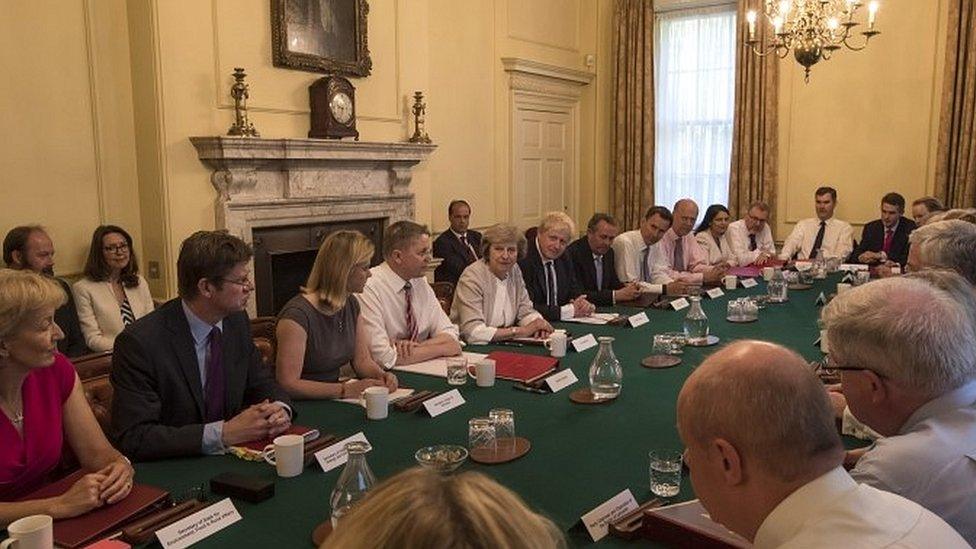
The main event: Theresa May has held a "Brexit brainstorm" at Chequers. The prime minister met cabinet colleagues to discuss developments since June's Leave vote. Mrs May has said the UK must focus on the "opportunities" on offer outside the EU as she reiterated there would be no second referendum. "We must be clear that we are going to make a success of it," the PM said. "That means no second referendum, no attempts to sort of stay in the EU by the back door. That we are actually going to deliver on it." The talks were billed as the most significant since the referendum result and took place following reports of tensions and diverging priorities among key figures. Two months on from the vote, the relationship the UK will have with the EU after its exit, in terms of access to the EU internal market and obligations in regard to freedom of movement, remains unclear. Former Foreign Office Minister Hugo Swire told the BBC there was a "definite fault line" between ministers who believed Brexit was chiefly about ending free movement and those who wanted to see more "flexibility", meaning the UK did not yet have its "ducks in a row" for negotiations.
Also in the news: The EU referendum result could be hijacked by "forces of racism, intolerance and hate", the Liberal Democrat leader has warned. Tim Farron turned his fire on outgoing UKIP leader Nigel Farage and French far-right leader Marine Le Pen, accusing them of a "hateful brand of intolerance, racism and insularity". He added that there was a "justified" anger at "the political class" amongst voters. National Front leader Ms Le Pen has said the UK's Brexit vote was "the most important moment since the fall of the Berlin Wall" and she and a number of other far-right leaders in Europe say they would like to hold their own referendums on EU membership. Mr Farage has always rejected similarities between UKIP and the National Front, accusing the French party of "anti-Semitism and general prejudice". Ms Le Pen, in turn, has accused Mr Farage of "aggression" against her party, for labelling it racist.
Financial news: There has been widespread criticism in the US of the European Commission's ruling that Apple should pay up to €13bn (£11bn) in back taxes. Earlier the European Commission said, external Ireland had enabled Apple to pay substantially less than other businesses, in effect paying a corporate tax rate of no more than 1%. "Member states cannot give tax benefits to selected companies - this is illegal under EU state aid rules," said Competition Commissioner Margrethe Vestager. The standard rate of Irish corporation tax is 12.5%. The Commission's investigation concluded that Apple had effectively paid 1% tax on its European profits in 2003 and about 0.005% in 2014. The White House said the ruling could cost US taxpayers, while the Republic of Ireland's government and Apple both said they disagreed with the record penalty. In the UK, confidence among consumers improved in August but remains below pre-Brexit vote levels, a survey has suggested. Encouraging economic data, low interest rates, falling prices, and high levels of employment have all contributed to a rise in confidence, market research firm GfK said, though there was a sharp drop in people's propensity to save in August. GfK's Joe Staton said there had been "some recovery" in consumer confidence in August compared with July, when the firm's figures suggested confidence dropped at its sharpest rate for more than 26 years.
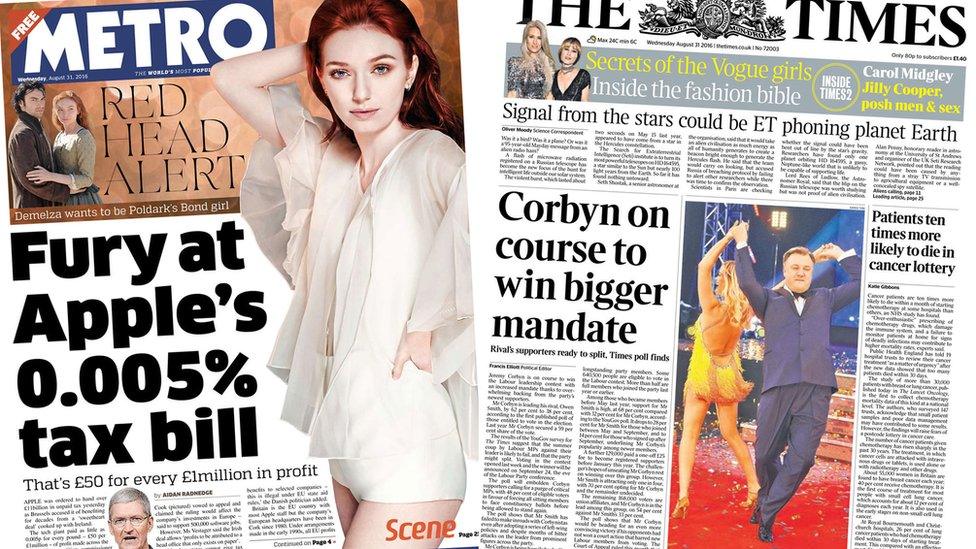
From the papers: "Brexit divisions emerge , externalas Whitehall draws up leave scenarios," says the Guardian, as Theresa May met her cabinet at Chequers. "Civil servants have been asked to assess the impact of a wide range of Brexit scenarios, from full membership of the European Economic Area (EEA) to a system under which some Europeans would need visas just to holiday in Britain," the paper reports. Meanwhile, the Express says that "nothing will stop EU exit", external as Theresa May "ruled out holding a second referendum to back the Brexit deal she will strike with the rest of the EU". Its article continues: "Her team also slapped down speculation she could hold a general election before the planned date of 2020, to give voters a chance to give their verdict on Britain's exit deal. She also does not intend to give MPs in Parliament a decisive vote on when to kick-start formal exit talks by triggering Article 50 of the Lisbon Treaty." And the i describes the backdated demand to Apple, external as "the world's biggest tax bill" and lists "what Ireland could buy" with the revenue that the European Commission has ordered Apple to pay. The Republic of Ireland could fund "100,000 new homes" or "a year of healthcare provision", it says.
Further reading:
After article 50: the EU trade and movement deals the UK could seek - the Guardian, external
Trade wars: Why the central pillar of global order is in danger of collapse as TTIP disintegrates - the Telegraph, external
Apple tax: UK says it welcomes any company after tech-giant hit with £11bn Irish tax bill - the Independent, external
Tuesday 30 August

The main event: The UK and France have pledged to work together and "step up" moves to improve the migrant situation in Calais. A statement, released after Home Secretary Amber Rudd met her French counterpart Bernard Cazeneuve, said both countries would resolve the situation through "close co-operation". It followed a call from the president of the region, Xavier Bertrand, for migrants in Calais seeking asylum in the UK to be allowed to lodge their claim in France. But this plan was dismissed by a Home Office source as a "complete non-starter". UK officials currently check passports in France, stopping many from entering. Debate over border controls was a key issue in the EU referendum campaign, with David Cameron claiming the Jungle could move to England if the UK left the EU. But just weeks after the warning, the then-PM and French President Francois Hollande agreed a "mutual commitment" to keep it in place. After the Brexit vote Theresa May and Mr Hollande reiterated the commitment.
Also in the news: The August bank holiday weekend saw a number of politicians and officials give their views of the UK's future relationship with the EU. Lord O'Donnell, a former head of the civil service, said the UK might remain in a "more loosely aligned" European Union, despite the referendum vote to leave. The former cabinet secretary told the Times, external it would take "years and years" to separate fully from Brussels and suggested that public opinion and the EU could change in the meantime. However, he added that "the probability of us not leaving is very, very low". Continuing membership of the single market was the main concern of Conservative MP and former minister Anna Soubry. She told BBC Radio 4's the Westminster Hour that it was "not impossible" to keep Britain in the single market while controlling immigration. Remain supporter Ms Soubry is one of a cross-party group of MPs backing the Open Britain campaign, calling for the UK "to have the best possible relationship with Europe in the future now that the country has voted to leave". On the same programme, Labour MP Stephen Kinnock attacked PM Theresa May's slogan "Brexit means Brexit", calling it the "most vacuous phrase in modern political history". He said the UK faces "a vast range of challenges" as it leaves the EU and added it was "about time that the prime minister got a grip on the situation". And Germany's vice-chancellor warned the future of the EU itself could be in doubt if the UK's exit was handled badly. Sigmar Gabriel said the EU would go "down the drain" if other states followed Britain's lead and that the UK could not keep the "nice things" about Europe while taking no responsibility.
Financial news: The UK is the most popular destination in the European Union for overseas firms, according to government figures. A record number of investments were made by foreign firms in the UK in the year to April 2016 - before the vote to leave the EU - with the Department for International Trade recording 2,213 inward investment projects, up 11% on the previous year. International Trade Secretary Liam Fox said the figures showed "the UK continues to be the place to do business". Economist Simon French commented: "What will be far more important than Brexit will be whether the political forces that shaped the vote to leave also put pressure on the UK to be a more closed/protectionist nation. This would have much larger (negative) ramifications for future inward investment flows."
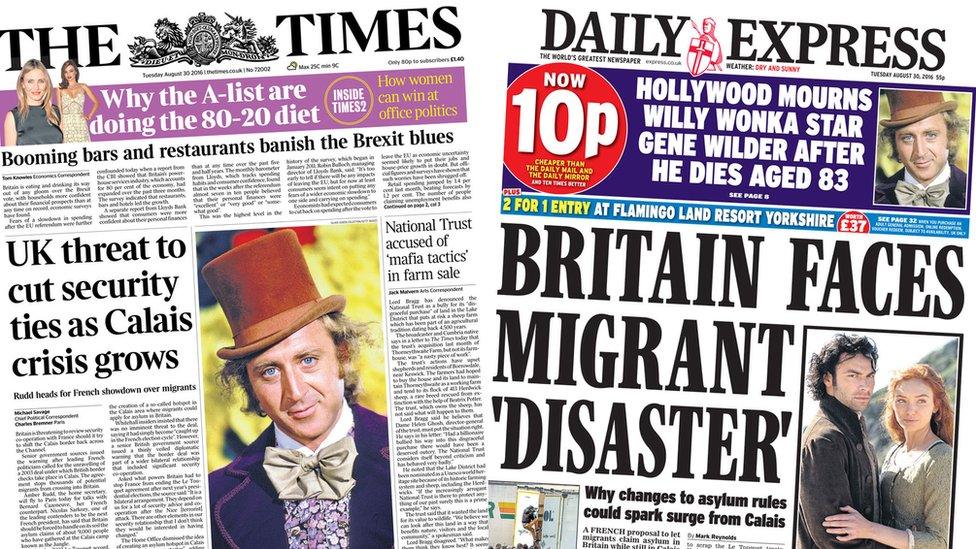
From the papers: "Britain is threatening to review security co-operation with France, external should it try to shift the Calais border back across the Channel," says the Times, as Home Secretary Amber Rudd prepared to meet her French counterpart, Bernard Cazeneuve. The article continues: "Senior government sources issued the warning after leading French politicians called for the unravelling of a 2003 deal under which British border checks take place in Calais." The Telegraph says the ministers' meeting "follows demands from French politicians to rip up the current arrangements in the wake of Brexit, external, a threat that experts said could double asylum claims to 90,000 each year". The paper also suggests that "President Francois Hollande, who agreed there would be no change earlier this year, could be unseated in the nation's 2017 elections". The Financial Times, external leads with a report that business organisation the CBI has urged the government to allow the banking industry "off the naughty step" and relax some of its regulation to help London "fend off post-Brexit challengers to its position as Europe's leading financial centre". The FT says that representatives from Poland are attempting to "lure some of Britain's biggest banks to Warsaw" following similar charm offensives from "Paris, Frankfurt, Amsterdam and Dublin".
Further reading:
Pre-Brexit vote research shows prosperity hotspots emerging across UK - the Guardian, external
David Cameron's fatal insouciance - New Statesman, external
Why Brexit has the X Factor - Spectator, external
And finally...
Could Brexit mean the return of imperial measurements? The Telegraph reports that "customers have been asking shop owners if they can order groceries weighed in pounds and ounces, external". Also weighing in, if you'll pardon the pun, is the British Weights and Measures Association, which campaigns against "compulsory use of the metric system" and which claims that pressure will grow on businesses and government to "restore freedom of choice". A leader column in the Telegraph argues that "many British shoppers still think in imperial measures" and claims that ordering quarter pounders in fast food restaurants means younger people are versed in the imperial system. Government sources told the paper that businesses could display imperial measurements "alongside metric" and said metric was "the system used by international trade" which was adopted in the UK before the country joined the EU.
Friday 26 August

A Polish family targeted by arsonists in Plymouth in July received what police called a "hate-filled" letter
The main event: "Divisive" and "anti-immigrant" rhetoric by UK politicians during the EU referendum helped to fuel a spike in race hate crimes in the weeks before and after the vote, a UN body has said. The Committee on the Elimination of Racial Discrimination said prominent political figures had "failed to condemn" racist abuse and created prejudices during the campaign. The report expressed concerns at the negative portrayal of immigrants in the UK and a rise of racist online abuse. Some 3,198 hate crimes were reported from 16-30 June - a 42% rise on 2015. Abuse peaked on 25 June - the day after the referendum result was announced - when 289 hate crimes and incidents were reported across England, Wales and Northern Ireland.
Also in the news: Labour leadership candidate Owen Smith has claimed party leader Jeremy Corbyn was "happy" about the UK voting to leave the EU. Mr Smith made the comments during a sometimes ill-tempered hustings debate in Glasgow on Thursday evening, even pressing Mr Corbyn to declare that he voted Remain. Mr Corbyn insisted that he did. Mr Smith is attempting to unseat Mr Corbyn less than a year after he was overwhelmingly elected as leader. The Labour leader has faced accusations from some in the party that he fought a "lacklustre" campaign for a Remain vote. Meanwhile, former Conservative cabinet minister and prominent Leave campaigner Iain Duncan Smith has reiterated that Britain does not need to remain a member of the EU single market to be prosperous. Mr Duncan Smith also said he believed Article 50 would be triggered early in 2017, saying it would be crucial in shaping negotiations, external. "You need to get on with a process because nothing focuses the mind than the idea that something is going to happen." He also dismissed rumours of tensions between cabinet ministers David Davis, Liam Fox and Boris Johnson as summer "who hates who" stories in the papers.
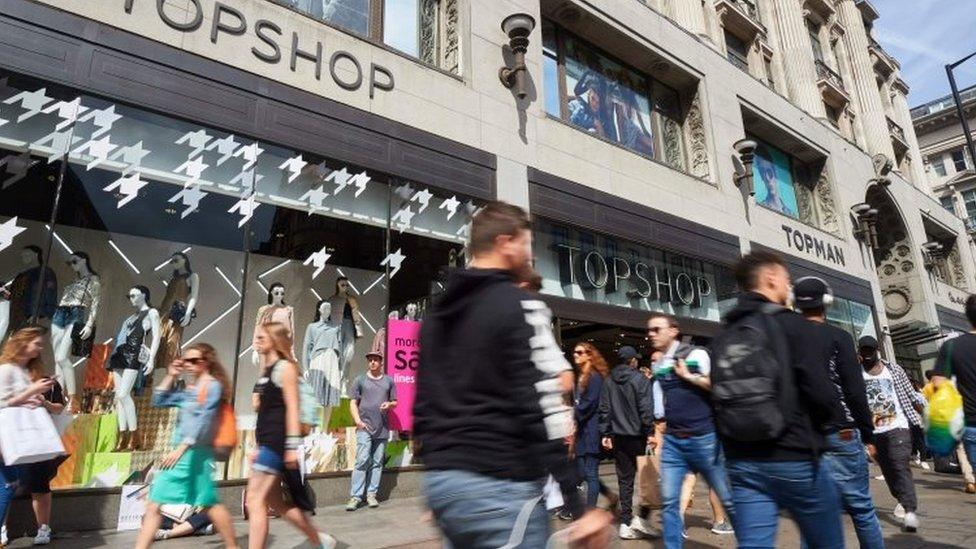
Financial news: Britain's consumers went on a spending spree in the run-up to 23 June's Brexit vote, revised GDP figures released by the Office for National Statistics, external show. The consumer spending increase, the biggest since before the financial crisis, powered the country's economic growth in the three months to June. The data also showed that investment by businesses unexpectedly rose compared with the previous three months. "Our survey returns, which include the period leading up to and immediately following the referendum, show no sign so far of uncertainty having significantly affected investment or GDP," Joe Grice, ONS chief economist, said in a statement. But Samuel Tombs, chief UK economist for Pantheon Macroeconomics, says the "deterioration of nearly every survey of economic activity" between the first and second quarter of this year suggests economic growth will be revised down eventually. "Looking ahead, consumers might be able to maintain strong growth in their spending for another quarter, but when inflation picks up in earnest early next year and firms follow through on plans to freeze hiring, they will have to slow down," he said. "Meanwhile, the slight rise in business investment in the second quarter provides little reassurance about the post-referendum outlook, since few businesses anticipated the Leave vote and surveys suggest firms are recoiling from major financial commitments in third quarter. As a result, we continue to see a high risk that the economy enters a mild recession over the coming quarters."
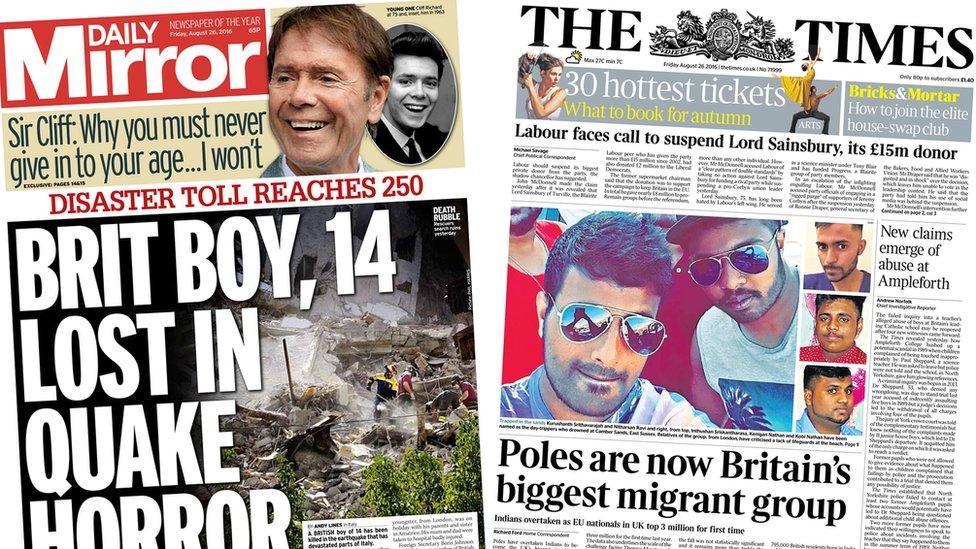
From the papers: The Guardian, external reports that "applications for British citizenship from EU nationals living in the UK rose by 14% in the run-up to June's referendum". According to Home Office figures, "the 15,501 applications received included a 26% rise in applications from Italians and a 9% rise from Polish nationals". Over at the Daily Mail, city editor Alex Brummer writes that "Britain is confounding the doom mongers and enjoying a Brexit bounce, external". While cautioning that "it is still early days" following the referendum in June, the article argues that "whatever damage was done to consumer and business confidence in the UK in the days after the referendum result, was a short-term shock that has been quickly overcome". And the Financial Times, external says that figures showing "net migration to the UK stayed at a near-record level of 327,000" are likely to "increase the pressure on Theresa May to curb freedom of movement" following the Brexit vote.
Further reading:
Britain is ready for a mature immigration debate. Is Theresa May? - Spectator, external
Britain's Polish wanted to stay here for ever, until the EU referendum - the Guardian, external
Thursday 25 August
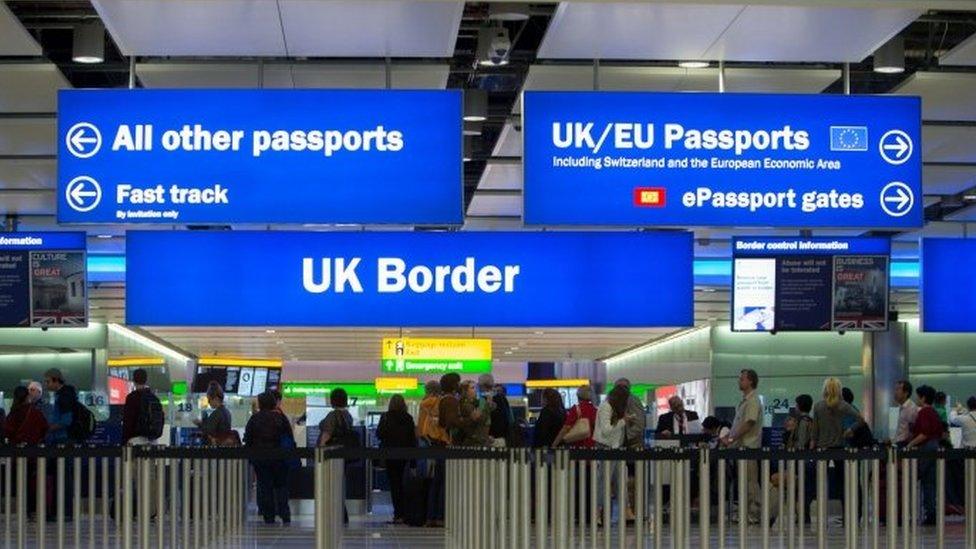
The main event: Net migration to the UK was 327,000 for the year to March, according to Office for National Statistics estimates. The figures, external - covering the period before Britain voted to leave the EU - were down slightly on record levels. The figure for net migration of EU citizens was estimated to be 180,000, a slight decrease on previous figures. The release of the figures followed a report, external arguing that the vote to leave the EU is a chance to fix the UK's "broken" immigration system and restore trust in controlled migration. Think tank British Future said the Brexit referendum outcome was a "vote of no confidence" in existing policies and public expectations of curbs on low-skilled migration must be met. The think tank has also released a survey suggesting almost half of Britons do not believe the government will reach its net migration targets. Ministers have pledged to reduce net migration to below 100,000 by 2020.
Also in the news: The US Treasury Department has warned the European Commission about taking action against US companies over tax avoidance allegations. The commission is investigating tax deals granted to US companies for setting up headquarters in Europe and is expected to deliver a decision on Apple next month. The company could be hit with a multi-billion pound bill for unpaid taxes. The commission said there was "no bias against US companies" in the probes but the US regulator said action by Brussels would make it into a "supra-national tax authority" overriding the tax codes of its member states. And Scotland's First Minister, Nicola Sturgeon, has appointed a minister, external to "lead the Scottish government's discussions with the UK government on our future relationship with the EU". SNP politician Michael Russell is to become Minister for Negotiations on Scotland's Place in Europe, subject to the approval of the Scottish Parliament. Mr Russell, a former education secretary in the Scottish government, will be tasked with "ensuring the best interests of Scotland are represented and protected in all Westminster EU negotiations". And, according to Ms Sturgeon, he will also have a role "influencing the UK's position" prior to the triggering of the Article 50 process to leave the EU. A majority of voters in Scotland backed remaining in the EU.
Financial news: Sterling was down a touch at $1.3219 but remained on track for a weekly gain of about 1.5% against the dollar. The pound is also on track for its best week in six weeks against the euro, despite falling 0.2% to 85.32 pence. However, the Munich-based Ifo economic institute has blamed Brexit for a hit to German business confidence, with orders in the chemicals and car industries particularly subdued. Klaus Wohlrabe, an economist at the institute, said: "Brexit has had a stronger effect now. Export expectations in the chemicals sector have fallen significantly due to Britain."
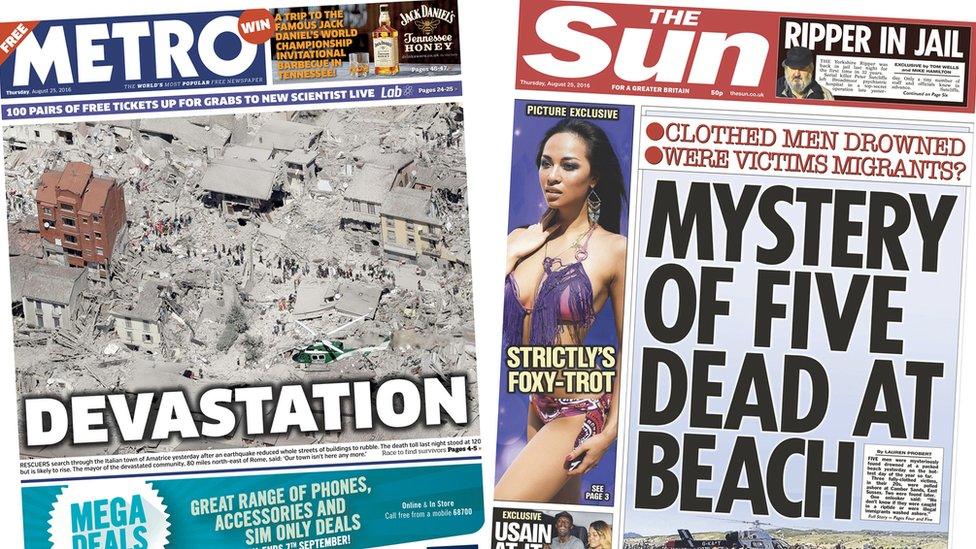
From the papers: The Telegraph reports that ministers are considering plans to require low-skilled migrants from the European Union to apply for permits to work in the UK, external once it leaves the EU. "Theresa May has said curbing net migration will be her 'absolute priority' during Brexit negotiations, despite warnings from EU leaders that Britain will be forced to leave the single market if it restricts freedom of movement," the Telegraph says. The Times, external reports that "the three cabinet ministers charged with delivering" Brexit have held a "private summit to 'clear the air' after weeks of leaks and simmering tensions over their respective responsibilities". The paper says the men it calls the "three Brexiteers" - Foreign Secretary Boris Johnson, International Trade Secretary Liam Fox and "Brexit" secretary, external David Davis - "have never had a close political affinity".
And finally...
Outgoing UKIP leader Nigel Farage has appeared at a rally for US presidential candidate Donald Trump. Speaking in Jackson, Mississippi, Mr Farage drew on parallels between Mr Trump's bid for the White House and that of the Brexit campaign's "people's army of ordinary citizens", which he said engaged successfully with the public prior to the UK's EU referendum vote. He said Brexit campaigners had "smashed the establishment" and the Republican Party candidate could do the same. But Mr Farage's association with Mr Trump has not gone down well with some senior members of UKIP, including its sole MP Douglas Carswell, who tweeted, external "it's all going a bit South Thanet for the US Republicans" - a reference to Mr Farage's failed attempt to win a seat in the Kent constituency last year. And Suzanne Evans, the former UKIP policy chief currently suspended by the party, suggested Mr Farage was trending on Twitter "for all the wrong reasons". And the outgoing leader is to be the subject of a a half-hour mockumentary, Nigel Farage Gets His Life Back. The title of the BBC2 comedy refers to the resignation speech made by Mr Farage in July, in which he said he wanted his life back. He will be played by comedian Kevin Bishop, who said the "colourful character" was a "gift to parody".
Wednesday 24 August
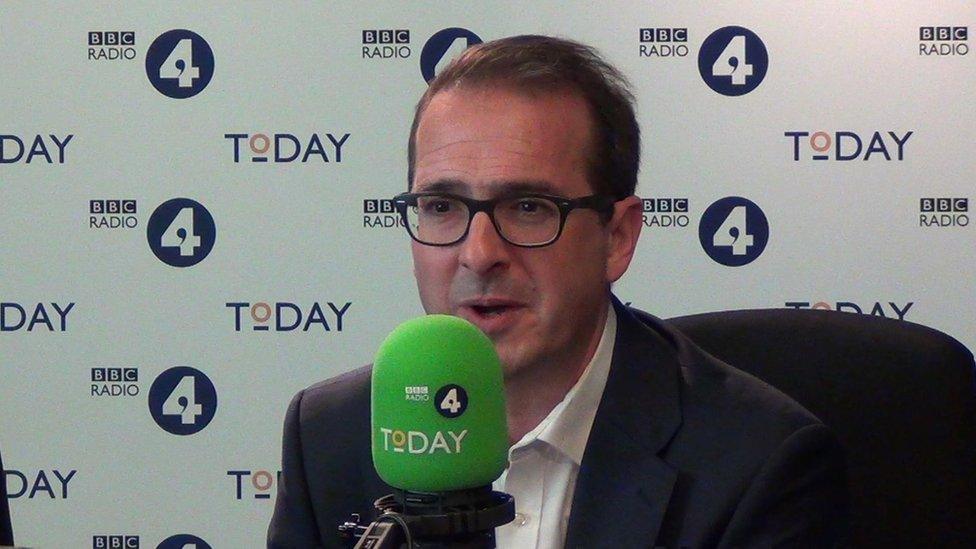
The main event: Owen Smith says that if he wins the Labour leadership contest he he will try to stop Prime Minister Theresa May triggering official EU exit talks unless she offers a referendum on the final Brexit deal or agrees to call a general election to approve it. He says that if he is elected leader, the party will oppose triggering Article 50 until the government commits to a second vote. Mr Smith's opponent Jeremy Corbyn has come under fire from some Labour MPs for what they saw as his half-hearted campaign to keep Britain in the EU. But Mr Corbyn's supporters have argued that not only did he put a proper shift in, his heavily caveated support for the EU is in tune with Labour voters. Mr Corbyn's campaign said Mr Smith's second referendum plan would be "deeply unpopular" and cost Labour "an awful lot of seats". Mr Corbyn has also set out some "red lines" Labour will be putting down during the Brexit negotiations, if he continues to be leader. They include "full access to the European single market" allowing finance companies to retain their rights to trade within the EU and ensuring Britain remains inside the European Investment Bank. His fourth "red line" will be ensuring "£existing EU employment rights and consumer rights and environmental protection regulations" are retained and, fourthly, that all current EU nationals who have migrated to live and work in the UK are able to stay.
Also in the news: Former foreign secretary William, now Lord, Hague has a new job advising companies on how to influence the government's approach to Brexit, according to the The Times., external The US company he is working for, Teneo, lists HSBC, Coca-Cola and Nissan among its clients, according to the newspaper.
Financial news: Britain's credit card habit has been unaffected by Brexit, according to the British Bankers Association. There were 168 million purchases on credit cards in July - the first full month since the Brexit vote. This was higher than in June and the average of the previous six months. However, the number of mortgages approved by British banks in July fell to its lowest in a year, the trade body says. The number of house sales has held steady, according to figures from HM Revenue and Customs,, external but Britain's commercial property market has taken a hit from Brexit, the figures suggest. The pound has held on to recent gains against the dollar and the euro, on the back of a run of better-than-forecast economic statistics (pound to euro: 1.1670, pound to dollar: 1.3181).
From the papers: Demand for new homes has soared since the Brexit vote according to one of Britain's biggest housebuilders Persimmon, the Daily Mail reports., external Canada's National Post reckons Brexit is likely to be "less of a drag" on the UK economy than feared and it could escape recession thanks to interest rate cuts and the underlying strength of the "real economy". The Independent's James Moore paints a less rosy picture, in his guide to post Brexit Britain, external, saying: "A decision of breathtaking recklessness and stupidity has cost UK companies billions if not trillions of pounds. And the price will continue to be paid for years to come."
Brexit: An experiment full of risk for British science - Financial Times, external
The euro has destroyed the EU and led directly to Brexit - Daily Telegraph, external
Tuesday 23 August
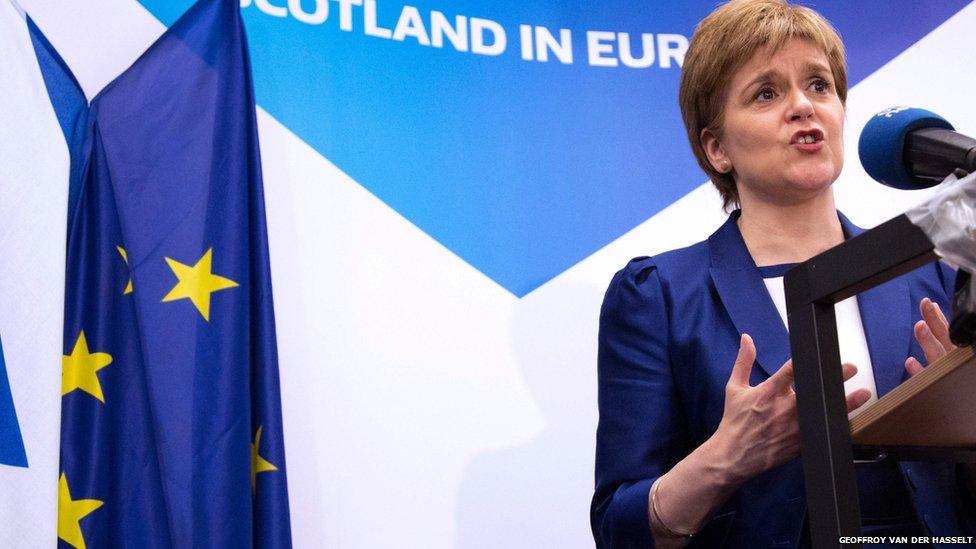
The main event: Leaving the EU could cost the Scottish economy billions of pounds, First Minister Nicola Sturgeon has warned. Ms Sturgeon published an analysis of possible Brexit consequences, which concludes Scotland could lose between £1.7bn and £11.2bn a year by 2030. But Scottish Conservative leader Ruth Davidson, who leads the opposition in the Scottish Parliament, urged the Scottish government to focus on stability in the wake of the Brexit vote. A Scottish government spokesman, in turn, blamed the Conservatives for Brexit. A majority of voters in Scotland voted to remain in the EU, and both Ms Sturgeon and Ms Davidson backed Remain.
Also in the news: A Welsh government minister has said the "jury's out" on the economic realities of Brexit. The Labour-led Welsh government warned of economic damage from a Leave vote, as did others in the Remain campaign. However, Skills Minister Julie James told BBC Radio Wales the economy "seems to be even-keeling at the moment". A majority of Welsh voters backed leaving the European Union, despite the Welsh government's stance. And, according to a job advert, the new permanent secretary to the Welsh government - the most senior civil servant in Wales - will play an "integral role" in getting the best deal for the nation as the UK leaves the EU. Current Permanent Secretary Sir Derek Jones is stepping down after four years and his replacement will be responsible for "ensuring that the Welsh government represents Wales' interest in emerging UK trade negotiations". Among the skills being sought, external are "solid commercial abilities".
Financial news: Persimmon, one of the UK's largest housebuilders, has said that customer interest in its houses has remained "robust" after the UK referendum. "While the result of the EU referendum has created increased economic uncertainty, customer interest since then has been robust with visitor numbers to our sites around 20% ahead year on year," said chief executive Jeff Fairburn. The boost to Persimmon and other building firms meant the FTSE 100 was 0.55% higher in early trade at 6866.39 points. Meanwhile, a survey of eurozone business growth suggested that any economic repercussions of the Brexit vote seem to have been confined to the UK so far. Financial information company Markit's Purchasing Managers' Index, external edged up to a seven-month high of 53.3 in August, from July's 53.2. "The euro area economy continued to expand at a steady pace," Markit said.
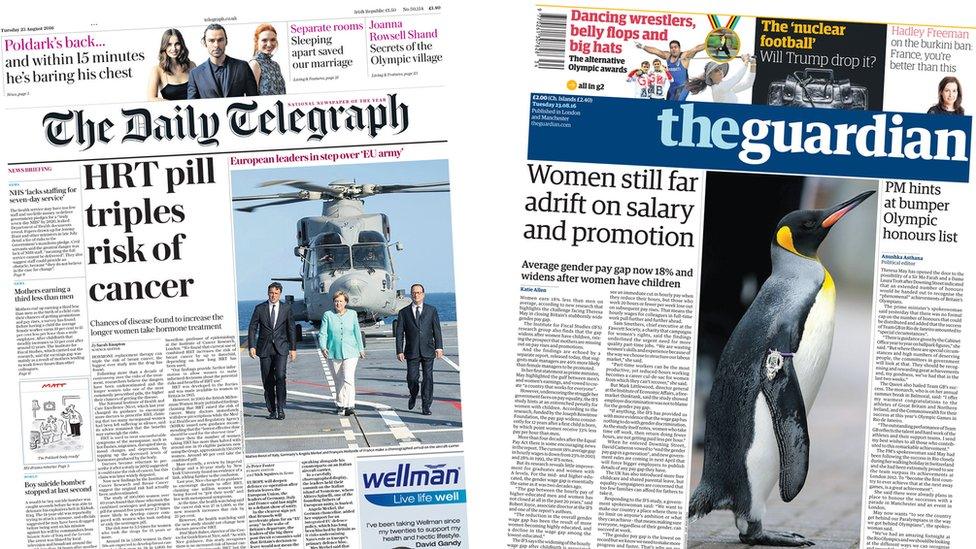
From the papers: The Telegraph and Financial Times carry front page articles about Monday's meeting of EU leaders in Italy. "Europe will deepen defence co-operation after Britain leaves the European union, the leaders of Germany, Italy and France said last night in a defiant show of unity," is the Telegraph's view, external of the talks. The paper says support from the French and German leaders for a more integrated EU defence policy is "the clearest sign yet that Brussels will accelerate plans for an 'EU army'". The FT writes, external that the three leaders "said they would not allow Britain's EU exit to drive the European integration project into reverse". The Guardian picks up on reports that "more than 10,500 Britons" have inquired about emigrating to New Zealand, external since the Brexit vote. "On 24 June, the day immediately following the vote, [New Zealand's imigration] website received 998 British registrations, almost 10 times as many as the previous day's tally of 109," the paper reports. The Guardian's source is the New Zealand Herald, whose own article suggests, external the country might appeal to disgruntled Remain voters because "we're more than 18,000km from Boris Johnson".
EU referendum two months on: the 10 steps that led to Brexit - the Guardian, external
Swedish PM warns May tax cuts would complicate Brexit talks - the Times, external
And finally...
After the European Parliament tweeted, external an alternative Olympics medals table putting the combined nations of the EU top, blogger Guido Fawkes tweeted, external a graphic which added up the total medals tally of what he calls "the former countries of the British Empire". The total "leaves Brussels for dust", he added. When Conservative Heather Wheeler shared the graphic with a medals table split between "Rest of World", "British Empire" and "EU post-Brexit", she provoked a backlash on Twitter. Labour MP and Remain supporter David Lammy tweeted, external that the post was "so deeply offensive to so many people and their ancestors" and called on Ms Wheeler to apologise. "Are you tweeting from the 19th century?" asked another Twitter user. Ms Wheeler, who campaigned for Leave, told the BBC it was a "tongue-in-cheek reply", adding: "My tweet says congratulations to Team GB and the Commonwealth."
Monday 22 August
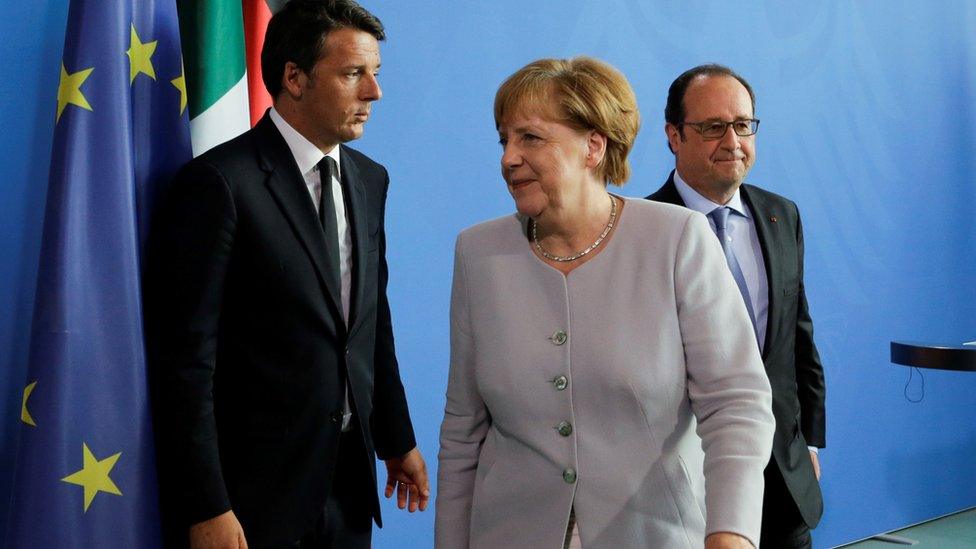
The main event: The leaders of Germany, France and Italy held an informal meeting to discuss the future of Europe in the wake of the Brexit vote. The venue was the tiny island of Ventotene off the coast of Naples, chosen for symbolic reasons. Two Italian prisoners, Altiero Spinelli and Ernesto Rossi, external, held on the island during the Second World War, wrote the "Ventotene Manifesto" calling for "a free and united Europe". Following their talks, German Chancellor Angela Merkel, French President Francois Hollande and Italian Prime Minister Matteo Renzi held a news conference on the Italian aircraft carrier Garibaldi, which is coordinating the EU's migrant rescue operation. Ahead of the talks, Mr Renzi wrote that the leaders wanted "to relaunch an ideal, external based on unity and peace, freedom and dreams, dialogue and identity".
Also in the news: Prominent referendum Leave campaigner Iain Duncan Smith has said Prime Minister Theresa May should begin formal negotiations for the UK to leave the EU "as soon as possible". He accused Remain supporters of trying to delay a triggering of Article 50, which starts the two-year process to leave the EU. Mrs May said she would not trigger Article 50 during 2016 but Mr Duncan Smith said she should start the process "early" in 2017, arguing that this would enable the UK to "get on and make the most of our new found independence".
Financial news: There is potential for a lose-lose situation when negotiations for the UK to leave the European Union take place, according to the director of a Brussels-based economic think tank. Guntrum Wolff of the Bruegel Institute told the BBC: "If both sides take a confrontational stance, they will both lose." Mr Wolff also said the possibility of another EU member country following the UK's Brexit lead is unlikely, though there were causes for concern including low growth in the Eurozone.
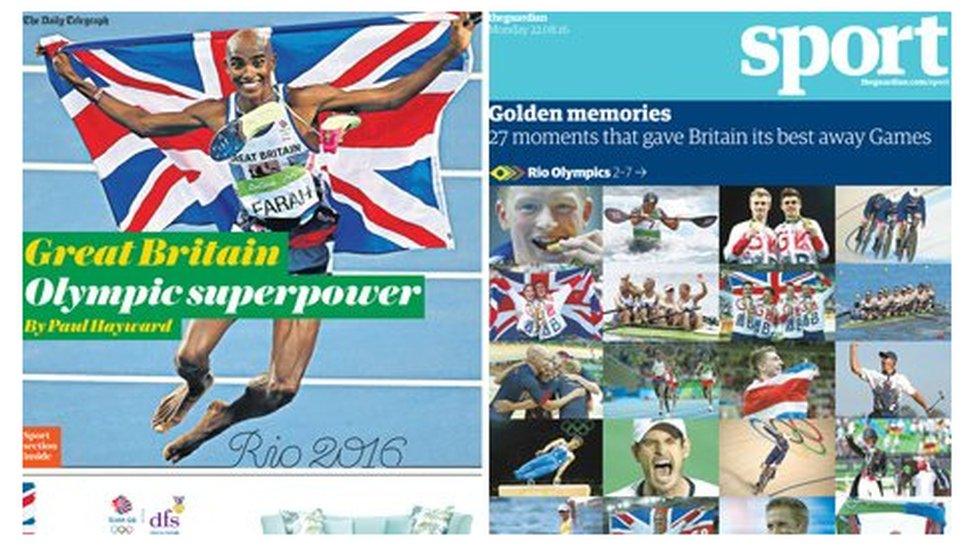
From the papers: Many papers lead with Team GB's Olympics success but the Financial Times, external warns that infrastructure spending has "declined sharply since the vote to leave the EU". The paper reports: "The value of contracts for July dropped to £1.5bn, a fall of 20% against the previous month and 23% lower than a year ago." This will put pressure on Theresa May "to press ahead" with new projects, the FT says. The PM might be aided in this by her Chancellor, if the FT's profile of Philip Hammond is anything to go by. Mr Hammond's "sober" image belies a "lively, risk-taking past" in business, the paper says, describing him as "a product of the swashbuckling Thatcher era". Over at the Guardian are two contrasting views of Brexit. Economist Anatole Kaletsky recalls the legend of King Canute, external and writes that the referendum result will "not turn back the economic tides driven by globalisation". He predicts: "As Britain's economy sinks into recession, and the government's promises of a quick 'successful Brexit' prove unrealistic, public opinion will shift." However, a piece at the weekend by the paper's own economics editor, Larry Elliott, says it is "obvious that the sky has not fallen in, external as a result of the referendum, and those who said it would look a bit silly". Mr Elliott says only "an extremely deep and prolonged recession" would make him regret voting to leave the EU's "failed project".
Further reading:
Brexit fuels Swiss anxiety over new deal with EU - BBC News
Tory splits on the European Union re-emerge - Telegraph, external
Want proof that Britain can thrive after Brexit? Look at South Korea - the Guardian, external
Memo to moping Remainers - Team GB shows how great Britain can be on its own - Daily Mail, external
We must listen to Leave voters but Britain cannot go back to the bad old days - New Statesman, external
And finally...
An alternative Olympics medals table, external, prepared by a German PR firm and tweeted , externalby the European Parliament, has generated quite a press reaction. The US topped the official table for Rio 2016 with 46 gold medals, with Team GB in second place with 27. However, Euro-Informationen in Berlin combined the medals haul of EU member states to put the European Union top with 106 golds - but this also removed Team GB's separate ranking, as the UK is still an EU member. "How dare EU?" asked the Sun, external. "Cycling couple Laura Trott and Jason Kenny have won over twice as many medals in Rio as the whole of Belgium combined but Berlin agency claims them for 'winning team'." Zoe Strimpel in the Telegraph, external declared: "The truly amusing irony is that this ghastly competitor tops the chart largely because of the incredible medal haul of Britain, the very country it is currently absorbed in shaming and punishing for its rankly disobedient vote in June to leave the EU." However, the Independent, external calls the list "the Olympics medals table Brexiters don't want you to see". It calls Team GB's performance in Rio "brilliant" but argues that the UK would be top of the medals table if it competed as part of an "all-EU team".
Friday 19 August
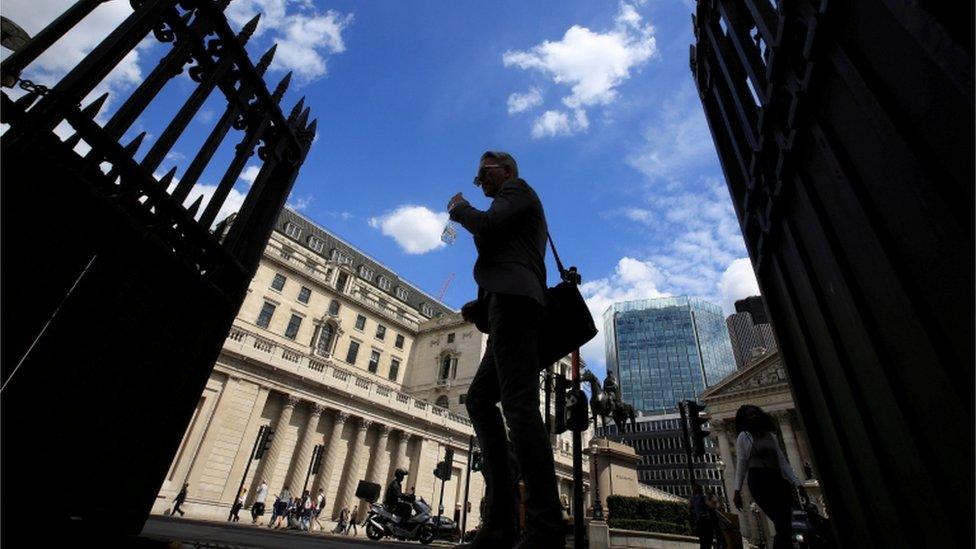
Teams across the City and Whitehall have been working on a plan for Britain's EU exit, says the FT
The main event: The City of London is seeking a "bespoke deal" having given up hope of getting full access to the European Union's single market, according to the Financial Times, external. The newspaper says those representing the financial sector will present their ideas to the government next month. The newspaper says the City thinks a Norway-style deal - with access to the single market but accepting free movement of people and contributing to the budget - would be "politically and practically very difficult" and is seeking its own "unique" deal - possibly a "beefed up version" of that used by Switzerland. BBC business correspondent Jonty Bloom says the Swiss deal with the EU would not be sufficient for the City because it does not include "passporting", which currently allows international banks and businesses based in London to do business anywhere in the EU.
Also in the news: The UK government has reported a smaller budget surplus than expected in July. It was in surplus by £1bn in July - compared with £1.2bn in July 2015. The government said the fact the public finances were in surplus showed the economy was in a "position of strength" to face post-referendum challenges. Meanwhile a Plaid Cymru MP has accused the Welsh government of a "reckless indifference" to the country's needs in the way it has responded to the Brexit vote. Jonathan Edwards contrasted Labour First Minister Carwyn Jones's approach with that of the SNP in Scotland - Mr Jones's office dismissed the complaints as "ridiculous". And it's not just the City of London putting its wish-list for European deals to the government, according to Bloomberg, external. It says tech firms and data-centre operators want a deal that "keeps internet borders open" - European online shoppers' details currently "zip across borders to giant data centres in the UK" - amid concerns that changing data-protection agreements could lead to legal challenges.
Financial news: Following on from the slightly baffling "They will soon be calling me MR BREXIT!" tweet from US Presidential candidate Donald Trump, the Telegraph's Tim Wallace has laid out why he believes Mr Trump is a "bigger threat to the global economy" than the UK's decision to leave the EU, external. In the Financial Times, BBC Money Box presenter Paul Lewis argues that the current weakness of the pound means the £75,000 limit on the amount of savings protected if a bank goes bust should rise, external.
From the papers: There's been a bit of number crunching as the papers try to weigh up Brexit's impact on the economy, two months on. The Guardian looks back at the week's economic data to see if it amounts to "boom or gloom?", external while the Telegraph comes down on the "boom" side of the argument, claiming it has the "five charts which show Britain has escaped an economics apocalypse, external". However elsewhere in the Telegraph, Allister Heath says, external that economists should "relearn a little humility" and admit that they cannot yet grasp the impact of a massive event such as Brexit as it is "far too soon" to tell. The Economist examines the difficulties, external of trying to leave the EU within the allotted two-year period, once Article 50 has been triggered, when trade deals are years in the making.
Further reading:
The Spectator says "it's time to defend Brexit, external", arguing there has been "silence" from Vote Leave and: "Brexit risks being defined by its enemies and moulded to fit their caricature."
Harry Phibbs, for Heatst.com, external, says reality is "finally silencing the Brexit doom-mongers" following news of a fall in unemployment claims and a boost to retail sales in July.
YouGov says, external its polling suggests most people - 69% to 22% - believe, to quote Theresa May, "Brexit means Brexit" but there is little support for a "hard Brexit" with the UK leaving without seeking any formal trading relationship.
And finally...
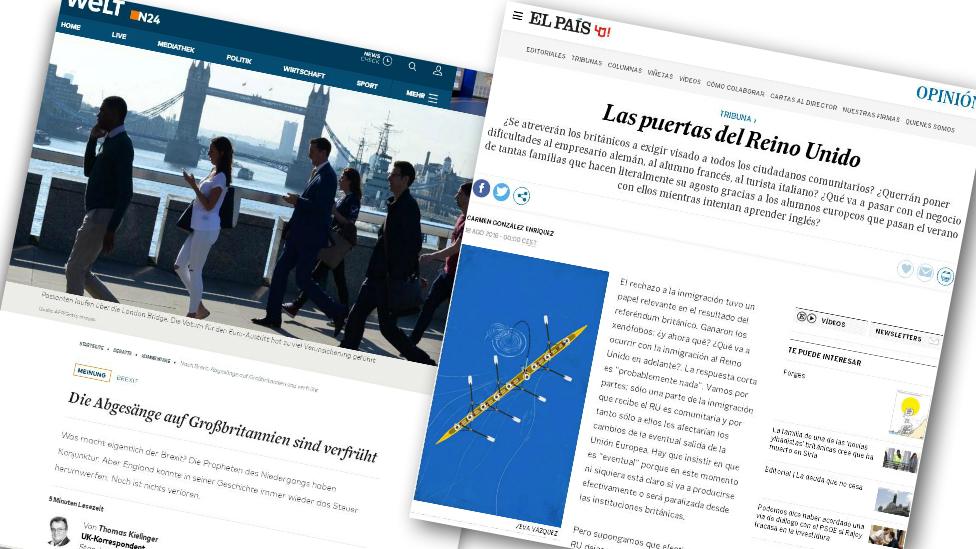
"Songs of mourning for Britain are premature," says Die Welt, while El Pais examines "the gates of the UK"
Does Team GB's success in Rio bode well for Britain post-Brexit? The UK correspondent of Germany's Die Welt, Thomas Kielinger, says its history shows it has the ability to adapt and England is "not yet lost". "You just need to look at the Olympic medal table," he adds. Other European press commentators think otherwise.
Thursday 18 August
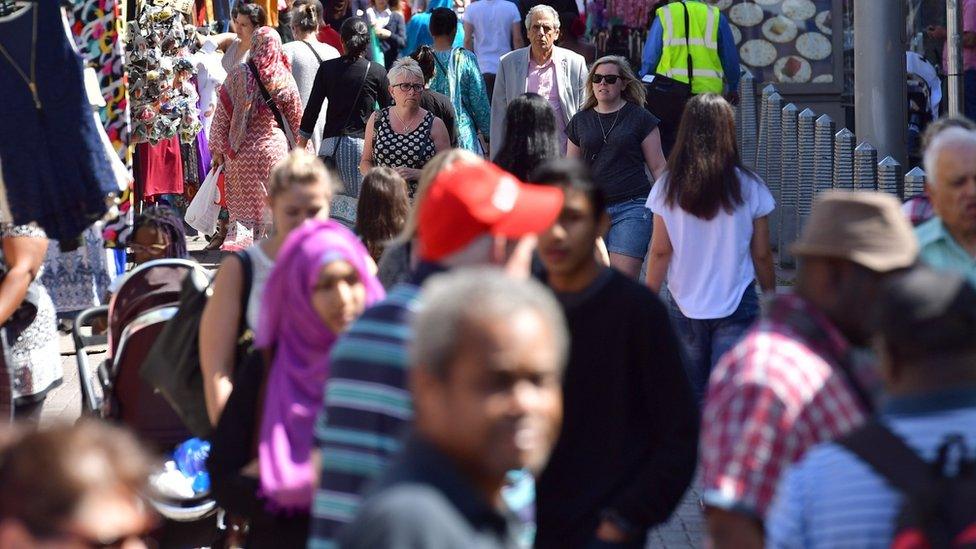
The main event: A new report from the Equality and Human Rights Commission, external has highlighted a "very worrying combination of a post-Brexit rise in hate crime and long-term systemic unfairness and race inequality", in the words of its chairman David Isaac. The review found that black and ethnic minority people in Britain still face "entrenched" race inequality in many areas including health, education, employment and housing. BBC political correspondent Ross Hawkins said the report also concluded there had been "a spike in racism and hate crime in England and Wales after the Brexit vote" while Scotland, where a majority voted to remain in the EU, showed lower levels of hate crime. The commission said "the evidence suggests the minority of people with racist attitudes used that result to legitimise racism", our reporter added, though he cautioned that the report's footnotes say the spike could also be due to "increased reporting of these events".
Also in the news: A former Conservative Party treasurer has suggested the departure of David Cameron and George Osborne following the Brexit vote may have been "unnecessary". Peter Cruddas, who was a key financial backer of the Vote Leave campaign, told BBC Radio 5 Live's Wake Up to Money that he couldn't understand why the then-PM and chancellor risked their positions by backing Remain. "I couldn't see why the politicians - the prime minister and the chancellor - really took sides," he said. "You know it's up to the people to decide, are we in are we out? Sure they can give their opinions, but to campaign hard for one side left them in an untenable position. And I still don't understand why they left themselves in an untenable position." Mr Cameron resigned as prime minister following the referendum result and Mr Osborne left the cabinet when Theresa May took over.
Financial news: The Co-operative Bank has said economic uncertainty following the UK's Brexit vote may hamper growth. The bank, which almost collapsed in 2013, after bad property loans contributed to a £1.5bn hole in its finances, said market conditions are "challenging" for retail banks. The Bank of England lowered interest rates at the beginning of August to a record low, as part of measures to stimulate the UK economy after the Brexit vote. Co-op Bank said the vote could also lead to a contraction in the UK property market, affecting mortgage loan growth. While banks might be feeling the pinch, warmer weather and a weaker pound helped boost retail sales in July, according to official data. The retail data went against expectations of an immediate hit to consumer confidence from the UK's vote to leave the European Union - though some analysts predicted tougher times ahead. And the weaker pound could benefit farmers, who - for the time being - still receive payments under the European Union's Common Agricultural Policy (CAP). The payments are calculated in euros, meaning there could be a 15% increase in farmers' EU subsidies once they're converted into sterling - about an extra £500m.
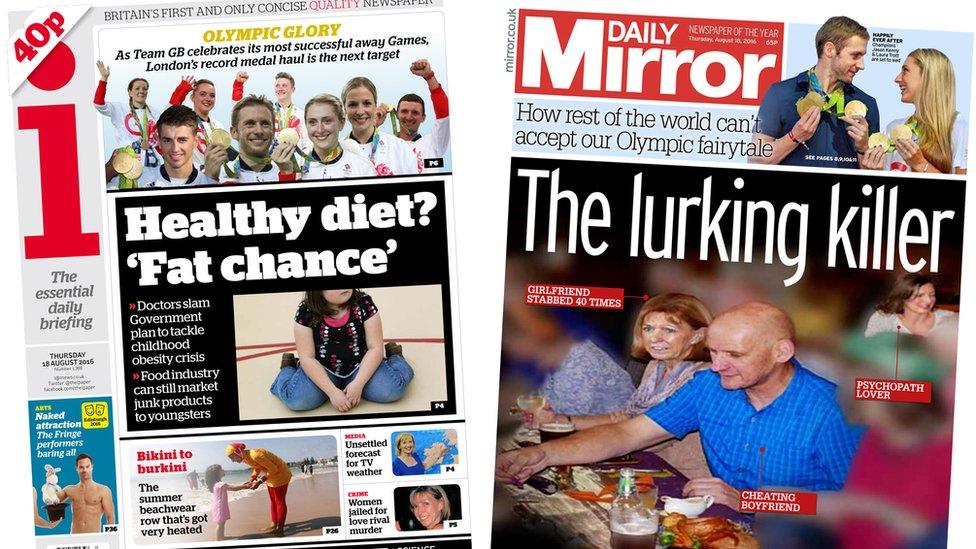
From the papers: The Telegraph's business section reports that ratings agency Moody's predicts that "Britain's economy will slow down but will not go anywhere close to a recession, external". The agency says a fall in sterling should offset the "negative effect" of post-Brexit vote uncertainty, though risks including further hikes in US interest rates "could derail this forecast". The Financial Times, external says a fall in UK unemployment figures in July are "a sign of the labour market's resilience after June's vote to leave the EU", although a fall in vacancies sent a gloomier signal. Elsewhere, Wednesday's figures showing the number of EU workers in the UK has risen to 2.2m attracts the attention of the leader writers in three of the papers that backed Brexit. The Daily Express call on the prime minister to "demonstrate a firm commitment to border controls", external during the Brexit negotiations. "Nobody wants to see the EU workers currently living here threatened with deportation," the paper says. "However it remains the case that we cannot accept a never-ending flow of new arrivals." The Sun, external says: "Jobs, wages and public services are under enormous strain. Brexit has handed Mrs May the mandate to fix that historic error." Meanwhile, the Daily Mail urges the prime minister to "hurry up, external and seize" the "great opportunities for a self-governing Britain" that it says Brexit provides.
Further reading:
Ignore the Brexit speed freaks - this is something which cannot be rushed - Telegraph, external
Brexit concerns behind Federal Reserve decision not to raise interest rates in July - Guardian, external
How the SNP can make the most of Brexit - Herald, external
The dilemma facing Scotland's Eurosceptic nationalists - BBC News
And finally...
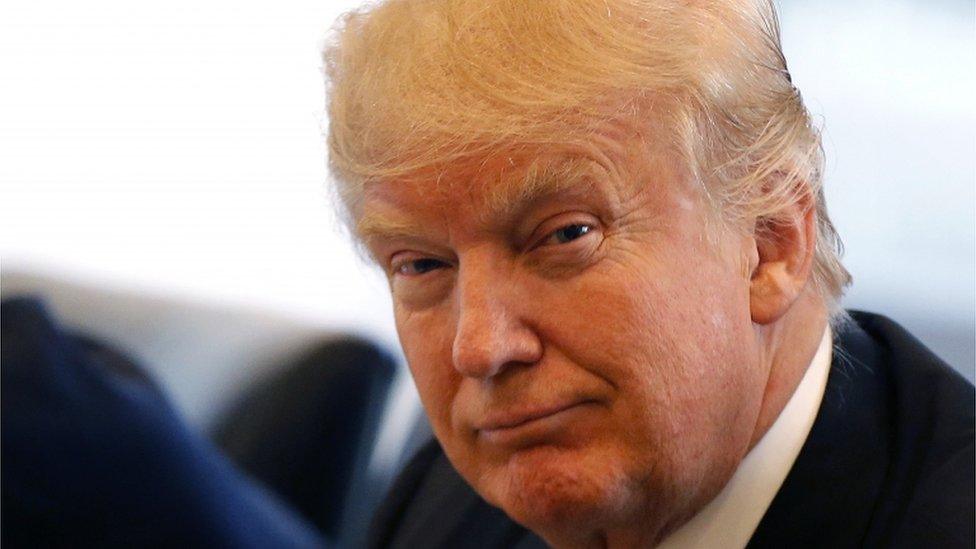
Say hello to "Mr Brexit"
The British Olympic Association has told a leading Brexit campaign group to stop using Team GB images in its social media posts. The group has received a letter - which it posted, external on its website - warning that its use of "Olympic-related intellectual property" was an infringement of the BOA's rights. Leave.EU said it would "continue to publish stories that showcase how Britain is thriving as we Leave the European Union" and accused the BOA of suing it "for pointing out how great Team GB are doing". However, the BOA said no legal action had been taken. Across the pond, US presidential candidate Donald Trump has, for some reason nobody seems able to fathom, tweeted, external: "They will soon be calling me MR. BREXIT!" As ex-Labour MP Ed Balls knows only too well, such cryptic tweeting invites merciless mockery. "Just to clarify for any Americans reading, we Britons have no idea what 'MR BREXIT' means either," read one tweet, while another Twitter user wrote: "Mr Brexit sounds like the worst superhero ever." And a Mr Brexit tweeted, external: "They will soon be calling me MR. TRUMP!". The Republican candidate was a keen supporter of Britain's exit from the EU, predicting, after the result, that the country would thrive.
Wednesday 17 August
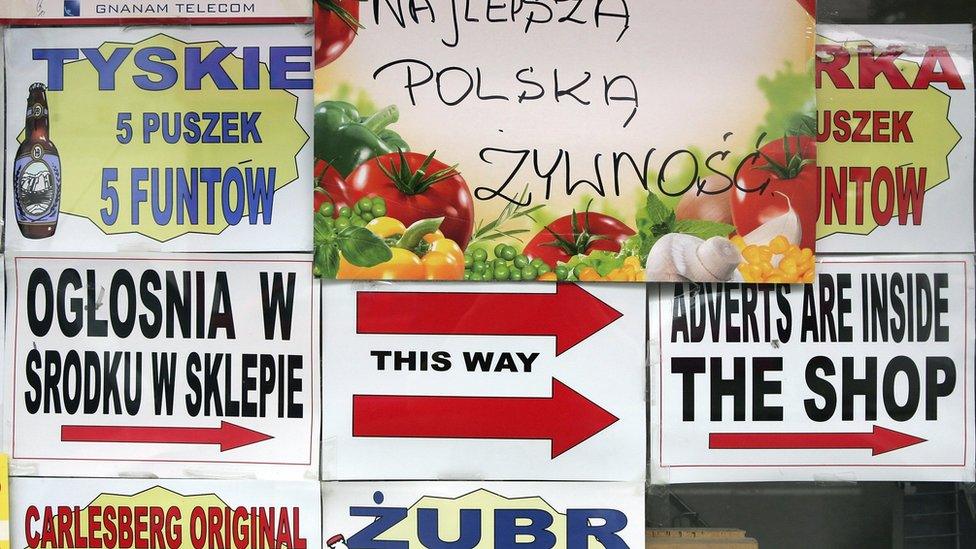
The main event: The number of UK workers from eight eastern European countries that joined the EU in 2004 has passed one million for the first time. From April to June, workers from the Czech Republic, Estonia, Hungary, Latvia, Lithuania, Poland, Slovakia and Slovenia increased by 44,000 compared to the same period in 2015. Official figures showed there were now a total of 2.23m EU workers in Britain. UK unemployment fell during the same three-month period.
Also in the news: Labour leader Jeremy Corbyn has said he wishes the UK had voted to remain in the EU as he faced renewed criticism of his role in the referendum campaign. "I did my best in that campaign," he insisted at a live BBC leadership hustings in front of party members. But one audience member said angrily: "David Cameron came across far more passionately than you ever did." However, another said he had been a Eurosceptic but Mr Corbyn persuaded him to vote Remain in June. Leadership rival Owen Smith said a deal reached in negotiations on leaving the EU should be "put back to the British people in a second referendum". And Scotland's First Minister, Nicola Sturgeon, has said it was "disgraceful" that the UK had not guaranteed the right of EU nationals to remain. She called for a guarantee as she hosted a question and answer session with hundreds of EU nationals, many of them concerned about whether they would have the right to live and work in Scotland when the UK leaves the EU.
Financial news: Total UK unemployment dropped between April and June in the run-up to the Brexit vote, official figures indicate. The UK's jobless total fell by 52,000 to 1.64 million and the unemployment rate remained at 4.9%. Howard Archer of IHS Global Insight said that the UK economy showed "impressive resilience in the run-up to the EU referendum and the immediate aftermath of the vote to leave". However, he warned: "It is premature to draw any firm conclusions from this... It remains likely that softening economic activity and heightened uncertainty will take a toll on the labour market over the coming months." And for the first time in at least three years, British holidaymakers have found that a pound buys less than a euro at some bureaux de change.
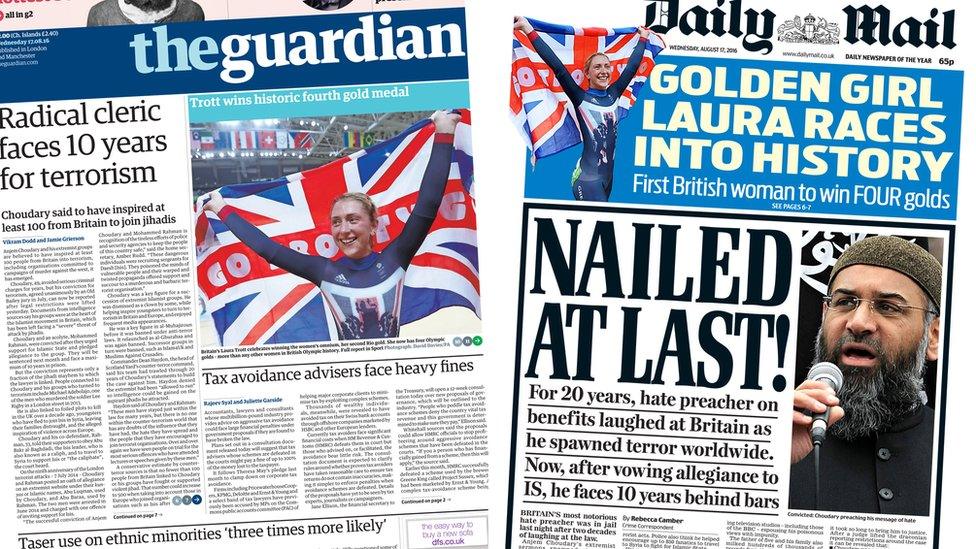
From the papers: The Times says figures showing a record number of people from eastern Europe, external were employed in the UK "will heap pressure on Theresa May before formal Brexit negotiations begin". Its article adds: "The free movement of people within the EU is likely to be a central issue." Meanwhile the Daily Mail interprets comments by German minister Michael Roth as indicating "Britain will be given a 'special status', external by the rest of the EU". EU officials have said access to the single market is conditional on states accepting freedom of movement of people but, while Mr Roth said there could not be "cherry-picking" by the UK, he added: "Given Britain's size, significance and its long membership of the European Union, there will probably be a special status which only bears limited comparison to that of countries that have never belonged to the European Union."
Further reading:
UK could win "special status" but must get on with Brexit - Germany - Reuters, external
While the three Brexiteers vie for the meatiest role, the big decisions will be taken at Number 10 - the Telegraph, external
We are Europeans. Brexit will make us face up to it - the Guardian, external
The English Patient? The UK's Desire to Redefine its Relationship with the EU and Germany's Role - Michael Roth at the LSE, external
And finally...
Did Daphne du Maurier predict Brexit? Breaking apart from Europe, resentment towards Westminster elites, financial uncertainty - the author anticipated it all in her 1972 novel Rule Britannia. It imagines a future UK facing severe economic instability after joining and then leaving the EU's predecessor, the Common Market. The electorate has voted to leave in a referendum and the government has instead formed a new union with the United States. However, when the marines arrive on British soil, it begins to look like an invasion. Du Maurier also envisions a divided political nation, with London-based characters such as the prime minister and financiers showing support for union with the United States, while much of the rest of the country fiercely resists.
Tuesday 16 August
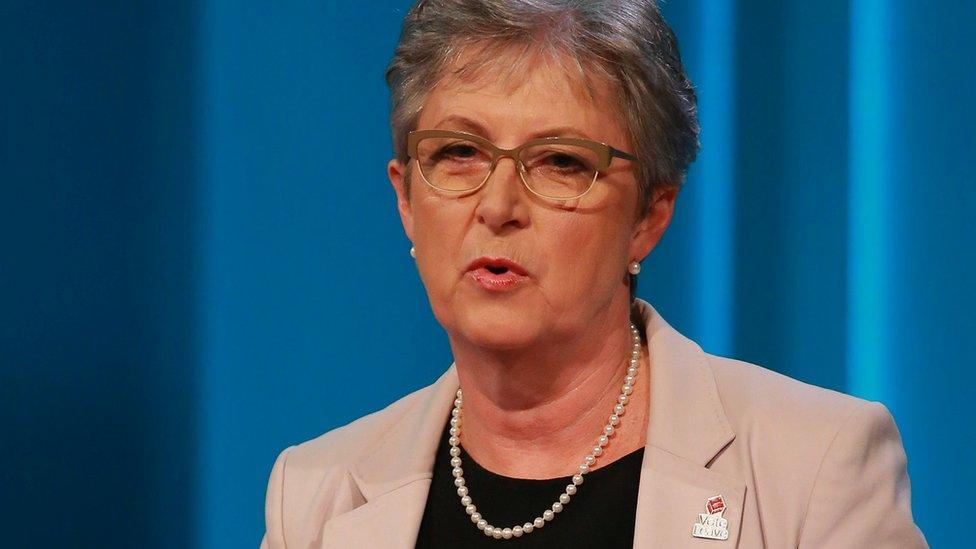
The main event: A leading Vote Leave figure has said EU citizens in the UK have been "left in limbo" since the referendum. Labour MP Gisela Stuart is to head a cross-party inquiry, for the British Future think tank, which will examine what kind of legal status could be granted to EU citizens in the UK. Ms Stuart, former co-chair of the Vote Leave campaign, said the government should make clear "soon" that EU citizens in the UK - about three million people - will be allowed to stay after Brexit. Ministers have said it would be "unwise" to fully "guarantee" EU citizens' rights without a deal for Britons abroad.
Also in the news: New Secretary of State James Brokenshire is on a fortnight's tour of Northern Ireland to canvass public opinion on the implications of Brexit. The Northern Ireland secretary said he hoped to spend August talking to business and community leaders and politicians, and would also meet groups representing victims and survivors of the Troubles. Mr Brokenshire said the UK was "a great and strong country with a bright future" and that Northern Ireland would have "a huge part to play" in that future. A majority of voters in Northern Ireland backed remaining in the EU and some politicians have voiced concerns about the implications for the land border with the Republic of Ireland.
Financial news: UK inflation, as measured by the Consumer Prices Index (CPI), rose to 0.6% in the year to July 2016, according to the Office for National Statistics. The price of goods bought and sold by UK manufacturers, the Producer Price Index, rose by 0.3% in the year to July 2016 following two years of falls. "There was no obvious impact on today's consumer prices figures following the EU referendum results, though the Producer Prices Index suggests the fall in the exchange rate is beginning to push up import prices faced by manufacturers," said Mike Prestwood, head of prices at the ONS. Meanwhile, the UK's benchmark share index fell in early trade, while the pound remained weak ahead of a big few days for economic statistics. Sterling has been under pressure as analysts wait for a string of key UK economic data due this week.
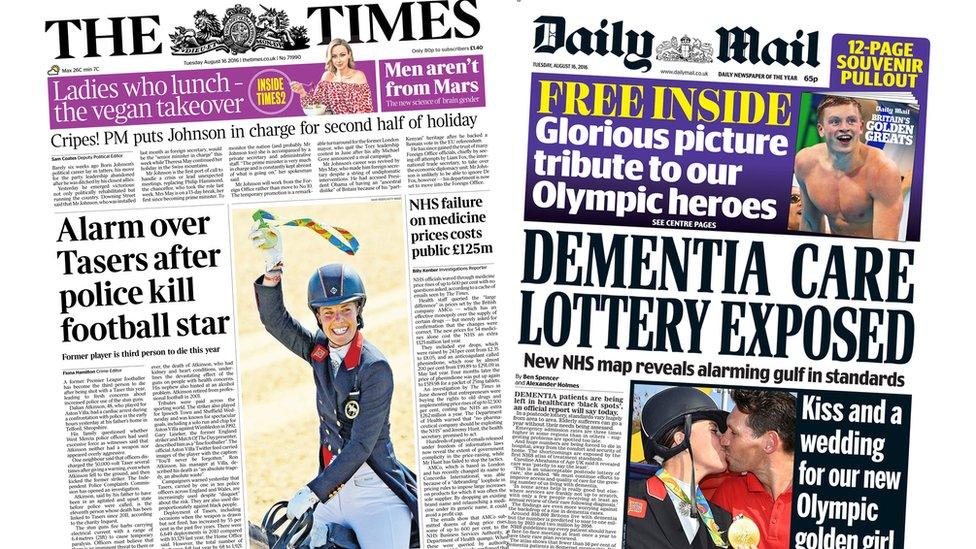
From the papers: The Guardian leads with coverage of a report from the Resolution Foundation, external which found, in the paper's words, that "damage to the economy caused by Brexit will more than offset the modest wage gains for British-born workers in low-paid jobs caused by cutting net migration to the tens of thousands a year". The Guardian says the think tank's report, external showed there "would be a small pay increase to native-born employees in sectors such as security and cleaning" but that "would fail to compensate" for higher inflation and an economic slowdown. The Daily Mail's comments section, external, however, says the report highlights "the negative effects of cheap foreign labour". It calls on the government "to implement a points system to control migration from within the EU without delay". And the Times reacts to the announcement on Monday that Foreign Secretary Boris Johnson is standing in for Theresa May, external this week: "Cripes! PM puts Johnson in charge for second half of holiday." After Mr Johnson abandoned his own leadership hopes after the EU referendum, he is now "not only politically rehabilitated but running the country", the Times adds.
Further reading:
What more does Boris Johnson need to do to be taken seriously? - Spectator, external
"Avoid diplomacy": five guidelines to help Boris Johnson run the country - the Guardian, external
Brexit bureaucracy will infuriate Out voters - the Times, external
Banks won't wait around to see what Brexit deal the UK can get - Bloomberg, external
And finally...
After Liberal Democrat leader Tim Farron said that "putting Boris in charge of the country is like putting the Chuckle Brothers in charge of Newsnight", the BBC programme did exactly that., external
Monday 15 August
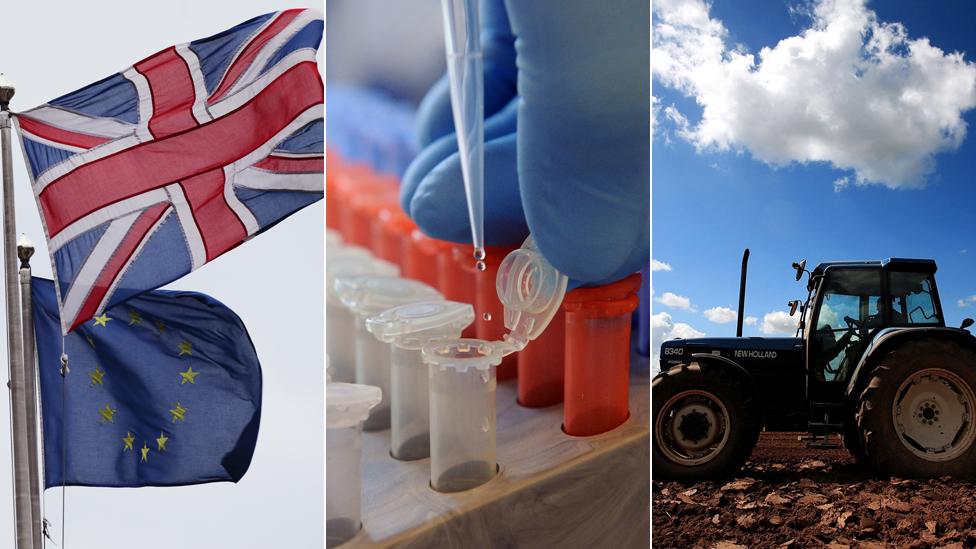
The main event: EU funding for farmers, scientists and other projects will be replaced by the Treasury after Brexit, Chancellor Philip Hammond has said. In a move which could cost up to £6bn a year, the Treasury announced that it would guarantee to back EU-funded projects signed before the chancellor's Autumn Statement later this year. Agricultural funding now provided by the EU will also continue until 2020. Shadow chancellor John McDonnell welcomed the weekend announcement but called on Mr Hammond to "speak up on the importance of keeping Britain's membership of the European Investment Bank". The Scottish government's Finance Minister, Derek Mackay, said the funding "leaves Scotland hundreds of millions of pounds short of what we would receive as members of the EU". And Welsh First Minister Carwyn Jones said the guarantee only covers "about half" of regional funding for Wales.
Also in the news: At a briefing for reporters, the prime minister's spokesman insisted that triggering Article 50 of the Lisbon Treaty, starting the two-year process for the UK to leave the EU, "won't happen before the end of 2016" - even when asked whether it may or may not be triggered at any time in 2017. If the process does not begin in 2017, that could mean the UK does not actually leave the EU until 2020. The spokesman also said Foreign Secretary Boris Johnson is the senior minister on duty in London this week, while Theresa May is on holiday in Switzerland, but he insisted the PM "is still very much in charge". Over the weekend, UKIP's Suzanne Evans told the BBC there was no need for the government to trigger Article 50, as it can bypass negotiations by transferring EU law into UK law. The government could then repeal the 1972 European Communities Act and "we'd be out as soon as Parliament voted on that", she claimed. She added that the person who wrote Article 50 "never thought it would be used" by an EU member state. And UKIP MEP Tim Aker told the Westminster Hour that, if the government does not put an end to free movement during Brexit negotiations, his party "wouldn't be able to print the membership forms quick enough for people to take them away".
Financial news: Some employers are becoming increasingly concerned about the potential impact of Brexit on their migrant workforces. Ian Brinkley, chief economist at HR professional body the CIPD, told BBC Radio 4's Today that some bosses are taking steps such as helping their employees to apply for British citizenship. If Brexit does happen, employers will have to spend more on skills and training, he said - but some could face recruitment issues given the already low unemployment rate and difficulties in getting staff from domestic sources. The FTSE 100 was becalmed as trading got underway for another week at 6,917 points - just 1.7 points higher. And housebuilder Bovis Homes said it was too early to tell what the impact of the EU referendum on the housing market would be but the "underlying market fundamentals for UK housing remain positive".
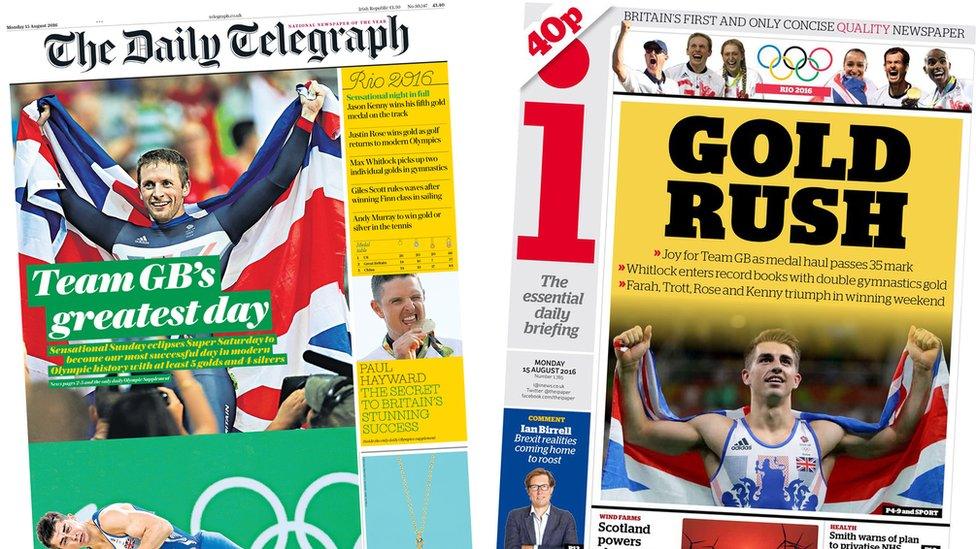
From the papers: While Team GB's Olympics medal haul dominates the front pages, the Times reports that a holidaying Theresa May has intervened in a "turf war", external between the senior minister in charge this week, Boris Johnson, and International Trade Secretary Liam Fox. The report follows a "leaked letter" obtained by the Sunday Telegraph, external. showing Dr Fox had "launched a power offensive" - in the Times' words - against Foreign Secretary Mr Johnson's department, suggesting the Foreign Office handle diplomacy and security but that promoting trade should belong to the Department for International Trade. However, Mr Johnson "robustly rejected the demands, it is understood". The PM created Dr Fox's department in the wake of the EU vote, also appointing David Davis as "Brexit secretary" - and the Times claims "civil servants fear that tensions will rise" between the two new departments and the Foreign Office. The PM's spokesman has said he "wasn't aware of" Mrs May having spoken to Mr Johnson or Dr Fox since the story of their row appeared.
Further reading:
Brexit seven weeks on: how many of the predictions have come true? - the Telegraph, external
Canada's trade deal with EU a model for Brexit? Not quite, insiders say - the Guardian, external
Brexit "will be delayed until end of 2019" - Sunday Times, external
Betraying Brexit: the revolt of the elites against the people - Spectator, external
A city left behind: post-Brexit tensions simmer in Bradford - New Statesman, external
And finally...
It would be an understatement to say that Boris Johnson standing in during Theresa May's holiday does not exactly inspire confidence in Labour MP Angela Eagle. The former Labour leadership candidate tweeted, external simply: "What? Aghhhh"
Friday 12 August
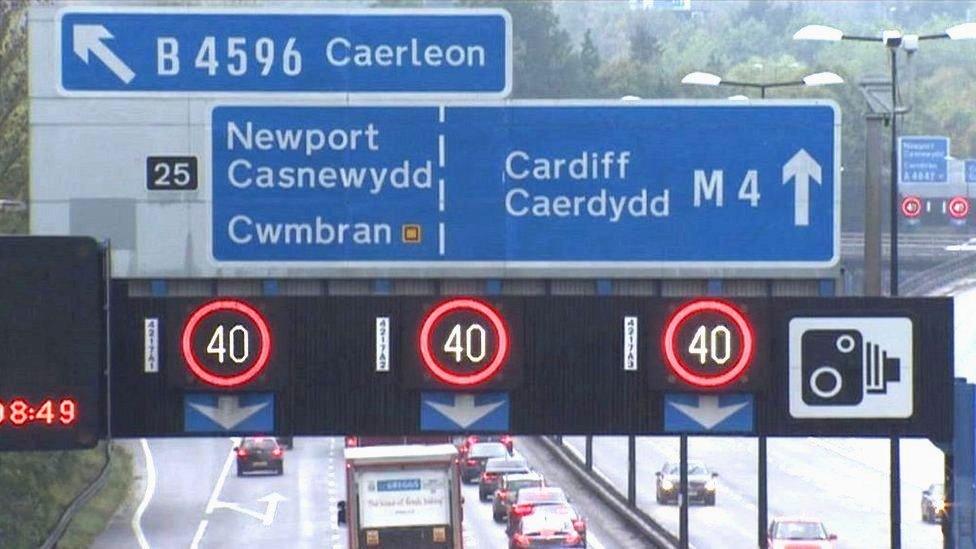
The main event: Wales should be allowed to borrow more money to prevent the economy suffering a Brexit "slowdown", Plaid Cymru leader Leanne Wood has said. From April 2018, ministers in Cardiff Bay will have the power to borrow up to £500m of capital money to pay for infrastructure projects. Under an agreement with the UK government, that money will be available earlier if it is spent on the planned M4 relief road around Newport - but Ms Wood said there should be no restrictions on how the money is spent. A majority of voters in Wales backed leaving the EU in June's referendum.
Also in the news: A victims campaigner in Northern Ireland has launched a legal challenge to Brexit. Raymond McCord, whose son was murdered by loyalist paramilitaries, is seeking a judicial review, arguing that it would be unlawful to begin the formal process of the UK leaving the EU without a parliamentary vote. His legal team also claim it could undermine the UK's treaty obligations under the 1998 Good Friday Agreement and the peace process. It is the first challenge of its kind in Northern Ireland, though similar action is under way in England.
Financial news: The CBI has said the UK's economic relationship with the United States needs "close care and attention" after the Brexit vote. With the details of the UK's future relationship with the EU - an important trading partner - far from clear, the business organisation said "the economic special relationship" between the US and the UK needs to be top of the list of government priorities. "The relationship between the US and UK is in incredibly good shape but we mustn't be complacent about it," said CBI director general Carolyn Fairbairn. Meanwhile, James Rosener, president of the European American Chamber of Commerce in New York, said US companies are now thinking hard about future investments and London could lose out to Frankfurt, Paris and Dublin. "I think the general consensus is there won't be any mass movement but it will occur in stages," he said.
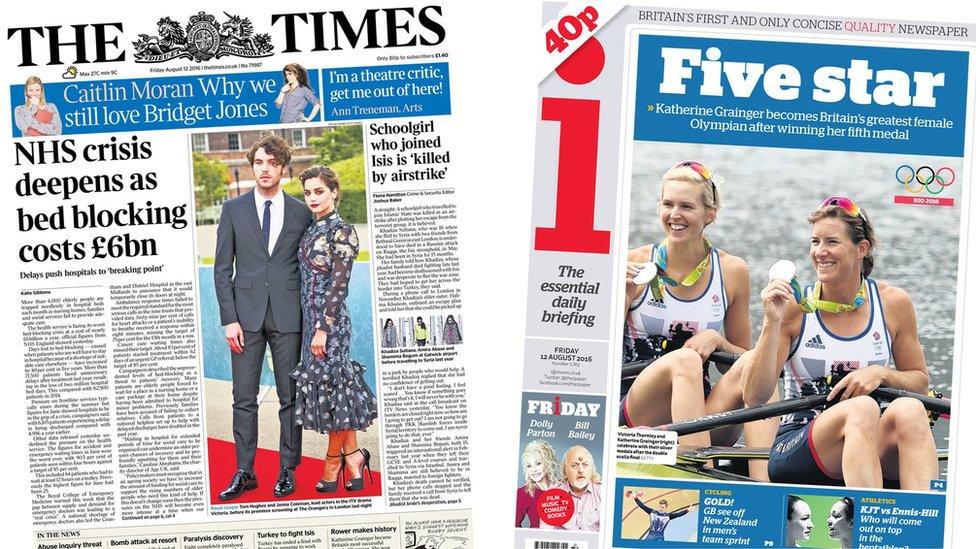
From the papers: At the Guardian, columnist Martin Kettle dismisses "chatter in Westminster" about the prospect of an early election. He argues that Theresa May will not call one, external, having said so when she launched her campaign to succeed David Cameron. He writes: "She said it because she meant it, and in part because the markets needed to hear her say it so soon after the Brexit vote." The piece follows former Conservative activist Tim Montgomerie's view in the Times on Thursday that the PM has "an open goal" if she went for an early poll, external. "Going to the country looks the safer option for the Tories and will also help the Labour Party by killing off Corbynism," he claimed.
And finally...
Anyone for an organogram? The government has unveiled the senior team at the new Department for Exiting the European Union, external. The department is responsible for negotiating the UK's exit and forging a new relationship with the EU. An organogram is a sort of professional family tree that shows the structure of an organisation in the form of a diagram. Heaven for politics and management geeks - if you can make sense of it.
Thursday 11 August

The main event: The UK housing market paused for breath after the Brexit vote, but could take off again over the next 12 months, a poll of surveyors has suggested. The Royal Institution of Chartered Surveyors (Rics) survey showed house price rises slowed significantly in the three months to the end of July. However, the Rics survey suggests that house price inflation could resume its upward path within a year. A month ago - in the wake of the EU vote - surveyors were evenly divided about whether prices would rise or fall over the next 12 months. But any such growth is likely to be modest compared to 2015, or the start of 2016, when prices were rising by up to 10% a year.
Also in the news: Theresa May is to take a summer holiday in Switzerland after her first month as prime minister, Number 10 has announced. Despite being in the heart of Europe, Switzerland is not an EU member or a member of the European Economic Area, but signed its first free trade agreement with the EU in 1972. It is currently embroiled in long-running talks with the EU over how to implement a 2014 referendum result in which the Swiss people backed limiting immigration through quotas, including EU citizens. But the PM has previously said she loves holidaying there because she can get some "peace and quiet".
Financial news: While the FTSE 100 fell, shares in travel group TUI climbed as it reaffirmed profit forecasts despite a difficult year for the travel industry. The company - which includes Thomson and Hapag-Lloyd cruises - said there had been "no apparent slowdown" in UK bookings following the Brexit vote. TUI said it can charge more for countries such as Spain as demand shifts there from North Africa and Turkey.
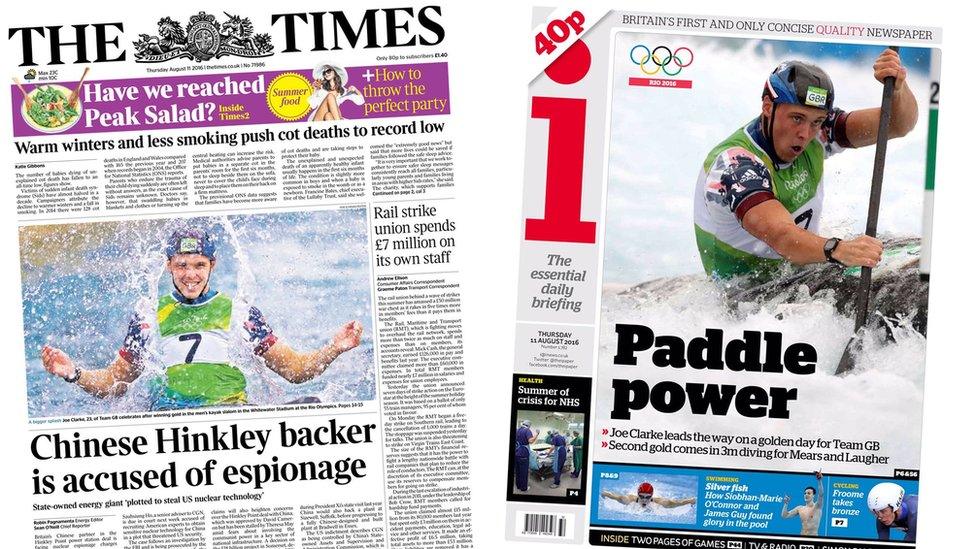
From the papers: The Financial Times reports that a fall in yields from government bonds has led to fears that the UK pensions industry faces a funding crisis. The Bank of England launched a "£70bn bond-buying plan", the paper said, "to stimulate the economy amid fears of a Brexit-related slowdown" which has pushed up prices and cut returns for investors. Pension funds invest heavily in government bonds and "the accelerating collapse of yields has widened already substantial gaps in many big pension funds". The FT also reports on the return of "some optimism" to the housing market, external. The Telegraph, meanwhile, noted that "Theresa May is following in the footsteps, external of the late Baroness Thatcher" by holidaying in Switzerland. "The late Baroness Thatcher holidayed in Switzerland several times during her premiership with the retired Tory MP Sir Douglas Glover and his wife Eleanor at their lakeside home in Schloss Freudenberg," the paper reported.
More reading:
Brexiteers are trying to defy gravity on trade - the Times, external
And finally...

An Ulster Unionist MLA has bitten back at Northern Ireland's first minister after she compared him to a "Chihuahua" in a verbal dog fight over Brexit. Arlene Foster campaigned for Brexit but the UUP accused her of a "U-turn" after she signed a joint letter to the prime minister outlining several concerns. Mrs Foster said the UUP had set up MLA Steven Aiken as its "attack dog" but claimed he was more like a Chihuahua. He snapped back that Chihuahuas were "small but intelligent and ferocious".
Wednesday 10 August
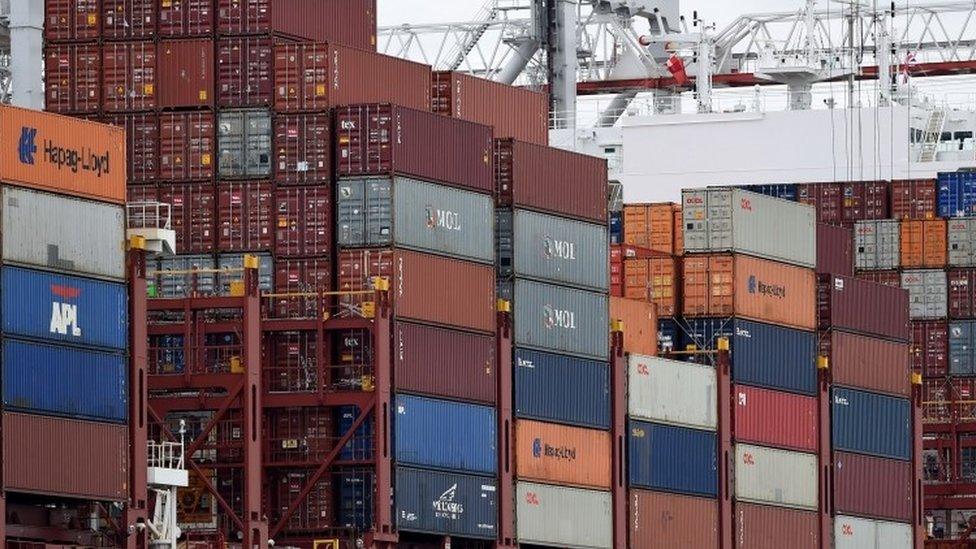
The main event: The cost to the UK of leaving the European Union without negotiating a replacement trade deal has been highlighted in a new report. The Institute for Fiscal Studies (IFS) said that if the UK failed to negotiate any new trade arrangements, the cost could be the equivalent of 4% of economic output. The government has yet to start negotiating the UK's departure from the EU following the vote to leave in June. Ian Mitchell, IFS research associate and co-author of the report, said: "From an economic point of view we still face some very big choices indeed in terms of our future relationship with the EU. There is all the difference in the world between 'access to' and 'membership of' the single market. Membership is likely to offer significant economic benefits, particularly for trade in services."
Also in the news: Nicola Sturgeon has announced £100m of extra funding to boost Scotland's economy and support businesses in the wake of the UK's vote to leave the EU. The Scottish government is to create extra support for job-creating projects and arrangements to help businesses deal with uncertainty. Ms Sturgeon has also called for the UK government to help boost the economy. The UK government's Scottish Secretary, David Mundell, is also to hold talks with business leaders and youth groups about Brexit - and has said he will work closely with the Scottish government. And a former adviser to the Welsh government has said Wales needs a dedicated minister for Brexit to co-ordinate its response to leaving the EU. Economist Gerry Holtham said plans to appoint an advisory group of business leaders and experts were "probably not sufficient".
Financial news: The Bank of England has stumbled in its post-Brexit economic stimulus plans after it failed to find enough sellers for new bond buying programme. It fell £52m short of its £1.17bn target to buy long-dated government debt, which has driven up prices and pushed down the return to investors. Printing money to buy up government bonds is a key plank in the Bank's plans to boost the economy, along with a cut in interest rates to a record low of 0.25%. In a statement, the Bank said it will make up the shortfall in the second half of the year, with details of exactly when to be announced in November. Meanwhile, a post-referendum fall in sterling has left the Ministry of Defence facing extra costs of up to £700m a year, say defence experts. The Royal United Services Institute (RUSI) says the increased costs are due to military equipment purchases made in US dollars.
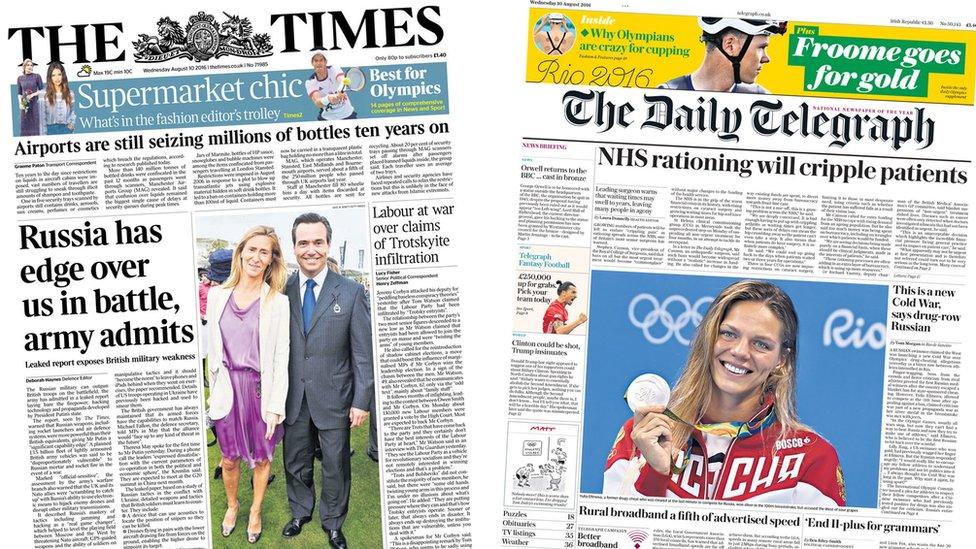
From the papers: "Britain could be up to £70bn worse off if it leaves the single market after Brexit because of slower growth," is the Telegraph's take, external on the IFS report. The article adds that EU leaders "have warned that Britain cannot remain a full member of the single market without agreeing to the free movement of EU migrants". The Times reports that "the value of the pound fell to its lowest level in a month" following a widening of the UK's trade deficit, external and warnings of more quantitative easing. The Express, meanwhile, says the UK adopting the so-called "Norwegian model" of single market membership outside the EU could be blocked by Norway itself., external "Oslo has said it may throw a huge spanner in the works by vetoing any future UK membership of the European Free Trade Association (EFTA) over fears such a large country would dominate the small group," the paper claims, However, it also quotes the leader of Norway's Socialist Left party arguing that the UK could help secure a better deal for countries including Norway. The Guardian has an extract from a new book by US economist Joseph Stiglitz, who argues that the EU's problems are chiefly the fault of the euro,, external which needs to be "radically rethought". Mr Stiglitz writes: "While there are many factors contributing to Europe's travails, there is one underlying mistake: the creation of the single currency, the euro. Or, more precisely, the creation of a single currency without establishing a set of institutions that enabled a region of Europe's diversity to function effectively."
More reading:
Europol first in line for life after Brexit - Politico, external
"The Euro: And its Threat to the Future of Europe" review - Financial Times, external
And finally...
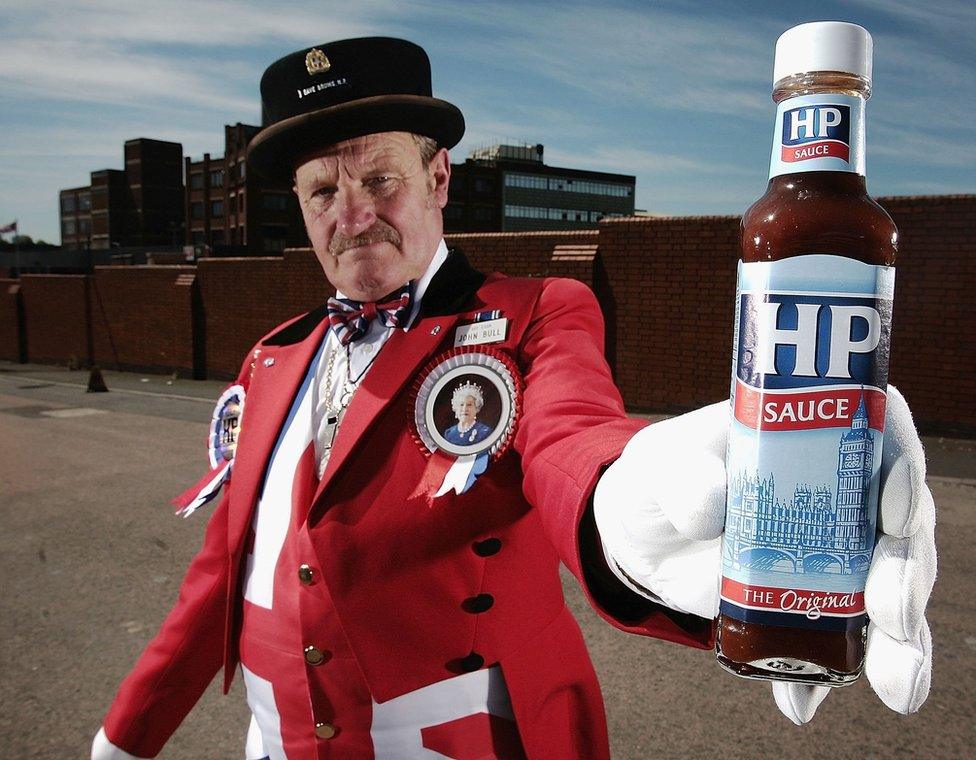
Do your favourite brands show how divided Brexit Britain is? Many attempts have been made to analyse the views and motives of Leave and Remain voters, but new analysis has looked at their consumer preferences. It suggests there are other profound cultural differences between the two sides beyond their attitude to the EU. Researchers looked at the data gathered by the polling organisation YouGov and have drawn up lists of the brands which are most highly regarded or used by Leave and Remain voters. The resulting Top 10 lists of brands most favoured by each set of voters were revealed in an article, external in the advertising trade paper Campaign. Top brands for Leave voters include HP sauce, Bisto, Birds Eye, PG Tips and ITV News. The Top 10 for Remain voters includes Instagram, Spotify, LinkedIn and, erm... the BBC website.
Tuesday 9 August
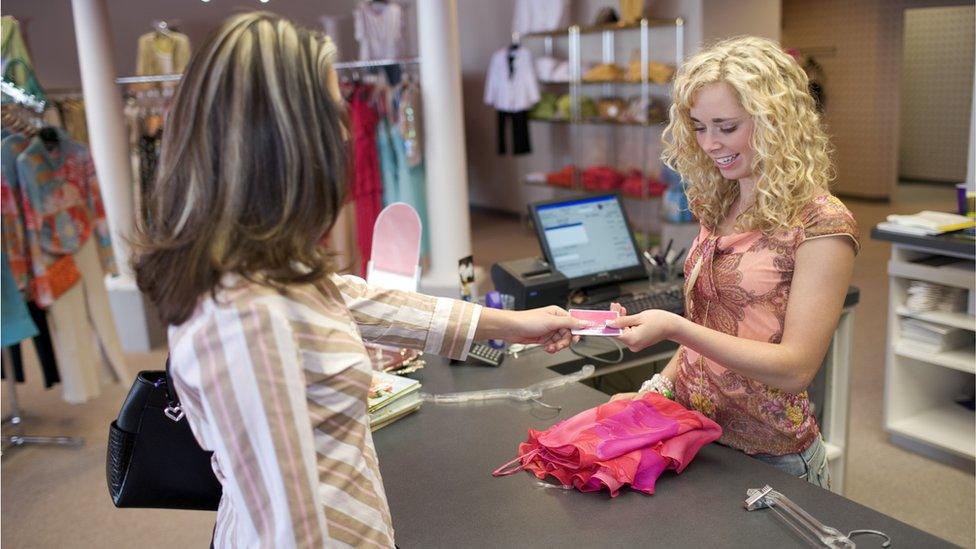
The main event: British retailers sold more in July than in the same month last year, defying predictions of a post-Brexit slump. Total sales increased by 1.9%, according to the British Retail Consortium and KPMG's latest survey. David McCorquodale, head of retail at KPMG, said warmer weather had "boosted the UK feel-good factor and gave consumers a sense that 'life goes on' following the initial shock of the Brexit vote".
Also in the news: Welsh First Minister Carwyn Jones is putting together an advisory group of business leaders and experts on Europe to help ministers understand the "real world impact" on Welsh communities, companies and public services. At the same time Welsh Conservative leader Andrew RT Davies predicted a surplus for Wales, external after the UK leaves the EU, and accused Labour of "wallowing in self-pity".
Financial news: The Office for National Statistics released figures showing that the UK's manufacturing industry picked up pace in June as the sector showed signs of recovery in the run up to Britain's vote to leave the European Union. Manufacturing output fell by 0.3%, stepping up from a 0.6% drop in May, but below the 0.0% expected by economists. "Very few" respondents reported an impact from the uncertainty surrounding the Brexit vote, the Office for National Statistics said. The pound was trading near a one-month low as manufacturing failed to meet expectations and the Bank of England's Ian McCafferty suggested more quantitative easing may be needed if the UK's economic decline worsens.
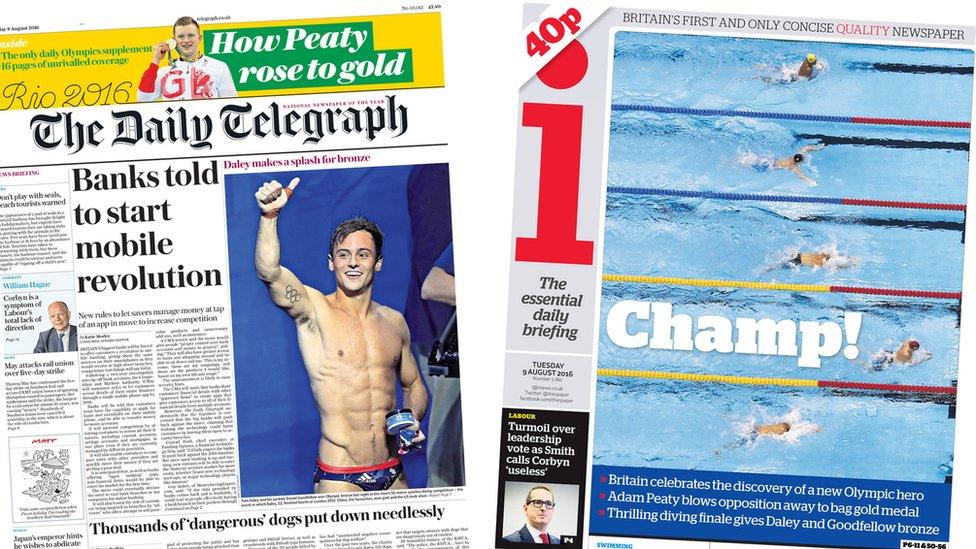
From the papers: In The Times, the Bank of England's Ian McCafferty writes, external that "after the Brexit vote the growth outlook deteriorated sharply" and if the economy continues to turn down "more easing is likely to be required". The same paper reports, external that Alan Clarke, an economist at Scotiabank, believes that Brexit will force the government to raise borrowing by £60bn. After yesterday's story that more tourists are coming to Britain in the wake of the referendum, the Daily Mirror points out the fall in sterling means, external a "pounding for Brit tourists' holiday money". Max Hastings writes in the Daily Mail, external that the UK needs a "migration minister" to ensure promises made during the campaign on controlling migration are kept. In the Guardian, a former EU ambassador to the World Trade Organisation predicts the UK could negotiate an EU trade deal within two years, external, contrary to what some European leaders have said.
More reading:
Options for the UK's trading relationship with the EU - Institute for Government blog, external
Why Brexit is not a foregone conclusion - PBS Newshour, external
Brexit killed UK's new and improved vibe - Gulf News, external
Monday 8 August
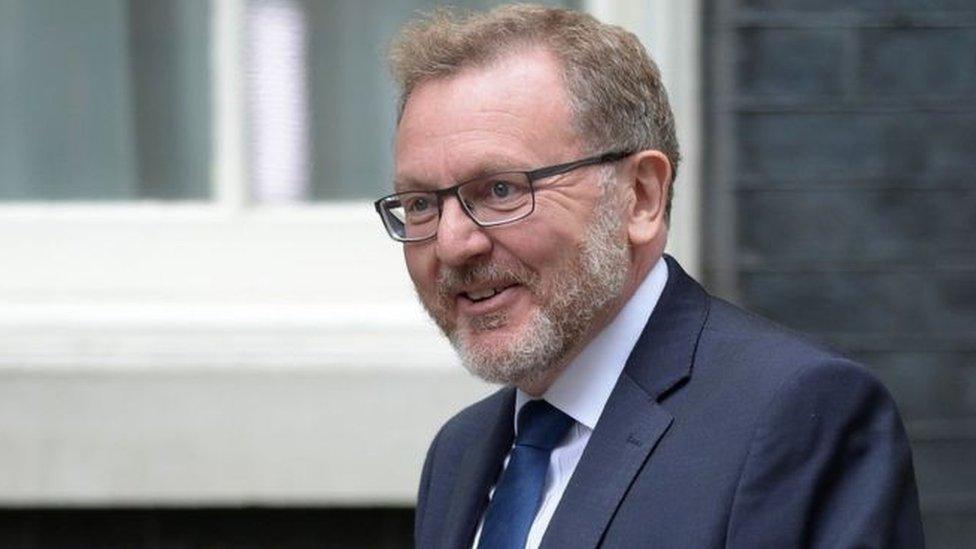
The main event: Scottish Secretary David Mundell has announced talks with key sectors in Scotland - including farming, oil and gas - on the impact of leaving the European Union. Mr Mundell said he wants to ensure Scottish interests are "at the heart" of Brexit negotiations. Last month First Minister Nicola Sturgeon detailed a number of areas she wants to protect as the process gets started, emphasising that a second referendum remains "highly likely". Mr Mundell has promised to work closely with her government.
Also in the news: Flight bookings to the UK have jumped since June, driven by a sharp fall in the pound. The think tank Policy Exchange has recommended that every British citizen should be given a unique "person number" in a register of the national population to help ease fears over immigration in the wake of the referendum - but the Lib Dems have criticised the idea as "ID cards by the back door". And the TUC has issued a call for zero tolerance on racism in the workplace, saying firms should set up systems so workers could report discrimination or abuse.
Financial news: UK consumer spending picked up in July, according to a survey from credit card company Visa UK which contrasts with other signs that Britons have become more cautious since the referendum. The latest business confidence survey from BDO showed optimism at a three-year low, but that the fall in sentiment after the Brexit vote was less than expected. Peter Hemington, of BDO LLP, said: "Brexit has compounded the continuing slowdown of the UK economy, but there is opportunity as well as challenge ahead for UK businesses.
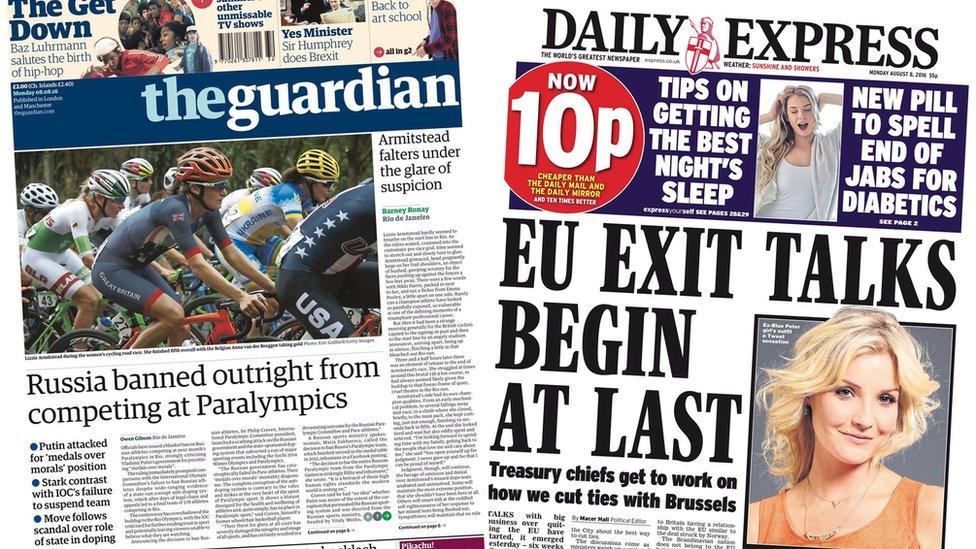
From the papers: The Times carries some comments by Iain Duncan Smith, external, who warns that Leave voters will not support a "Brexit-lite" option, and rubbishes the idea that the House of Lords could block activation of Article 50, the formal mechanism that will take Britain out of the EU. In the same paper, there's a report that Brexit Secretary David Davis is fighting to prevent his department being relocated, external from Downing Street to Whitehall, apparently believing it to be "too far from the centre of power". The Sun observes that the Queen's former communications secretary, James Roscoe, has been appointed an adviser to Foreign Secretary Boris Johnson, and the Daily Mail features former minister Anna Soubry's opinion, external that the Remain campaign made a "terrible mistake" in not taking immigration concerns seriously enough. The Financial Times has a post-mortem of most pollsters' failure, external to accurately predict the outcome of the EU referendum, with several commentators of the view that polling companies may have got "caught up in the political zeitgeist".
More reading:
Uncertainty gives Brits in Brussels the blues, by BBC political reporter Adam Fleming
After Brexit, the sugar rush, on Politico, external
Treasury looks at quitting the single market as City rejects Norway option after Brexit, in The Telegraph, external
Invoke Article 50 now? Be careful what you wish for, on LSE Brexit blog, external
And finally...
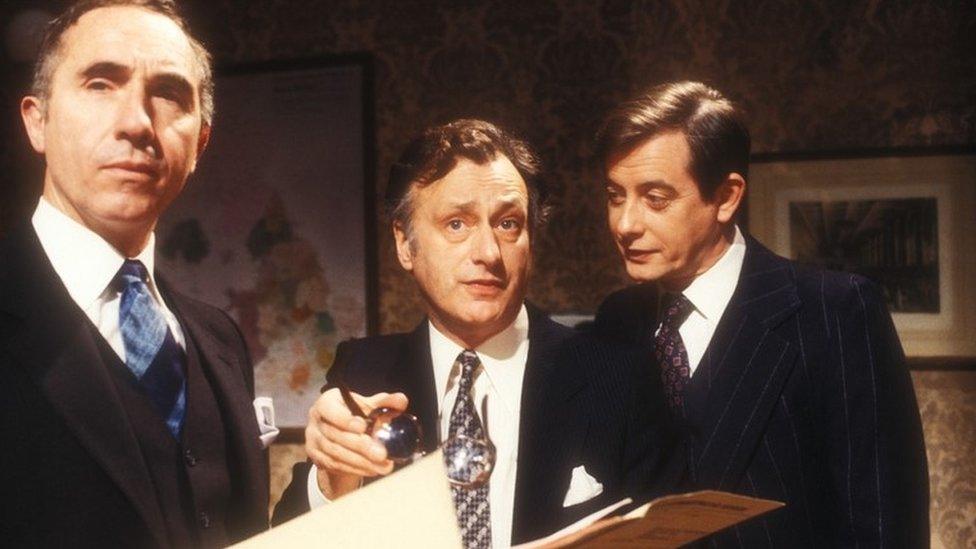
The Guardian has some fun with the meaning of Brexit, in a sketch, external by the creators of BBC sitcom Yes, Prime Minister, Jonathan Lynn and Antony Jay, who imagine what their legendary civil servant Sir Humphrey would make of it all. "Just move all the paperwork from your in-tray to your out-tray," the wily Mandarin tells his boss. Problem solved.
Friday 5 August
Bank of England deputy Ben Broadbent says it is "likely" interest rates will be cut again
The main event: The Bank of England deputy governor, Ben Broadbent, told the BBC's Today programme there could be a further interest rate cut this year if the economy worsens, following Thursday's cut from 0.5% to 0.25%. Mr Broadbent said the Bank had acted after a series of surveys since the referendum on most aspects of the economy, including employment, the housing market and business confidence, which had turned down markedly.
Also in the news: The referendum was also a point of conflict in last night's Labour leadership hustings, with challenger Owen Smith sticking to his promise of a second referendum and Jeremy Corbyn saying he accepted that the "majority of people, sadly, did vote to leave" the EU and the party "has to win those people back". IHS Markit's monthly jobs report suggests the number of people in the UK securing a permanent job has fallen for two months in a row, with participants citing uncertainty caused by Brexit, although the group which sponsors the survey predicted confidence could return to employers as the political situation stabilises. The chief executive of Renault-Nissan has told the BBC he is "reasonably optimistic" that the UK will be an important partner with the EU, despite its vote to leave.
Financial news: The FTSE 100 has erased earlier gains to be flat at 6,741 - not helped by a 6% slide in RBS shares. That was after an earlier jump to its highest level in a year this morning as investors welcomed the Bank of England's new stimulus package.
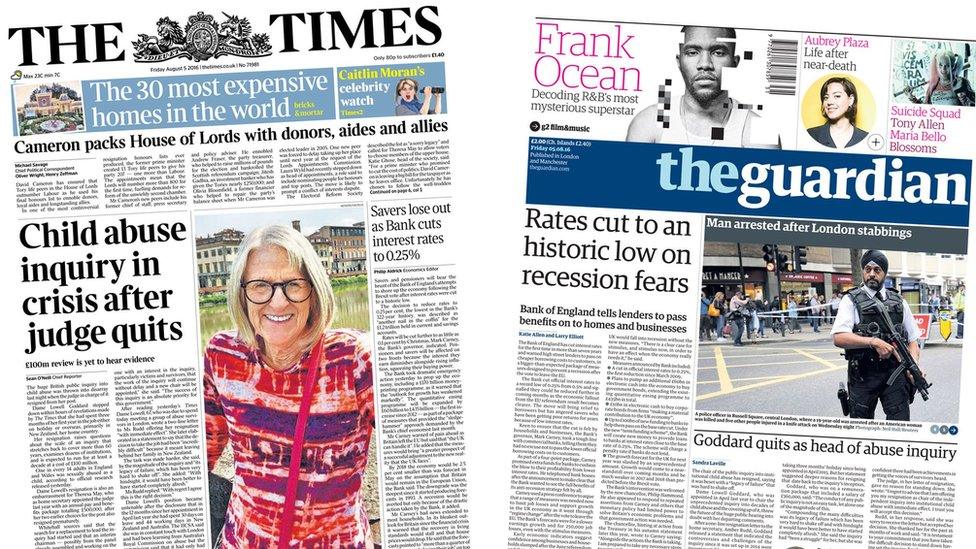
From the papers: The Financial Times is considering the consequences, external of yesterday's rate cut, saying that business is "split" over the decision - some industry representatives welcoming it and others predicting it won't have much impact. The Times looks at a poll, external by Ipsos MORI suggesting the French will be the "least sad" to see the UK leave the EU and that many Italians are planning to stop buying British goods. In the Guardian, there's a feature on the impact of the referendum on the Edinburgh festival, external, reporting some comedians have had to rewrite their acts as it would be "odd not to talk about Brexit".
More reading:
Is the UK going into a recession? by BBC Reality Check
Brexit means that Britain will be boss again, by Daniel Hannan in The Spectator, external
Britain will struggle to make EU migrants "go home", on the Centre for European Reform blog, external
Labour will stay trapped in its Europhile bubble until it accepts Left-wingers wanted Brexit too, in The Telegraph, external
And finally...
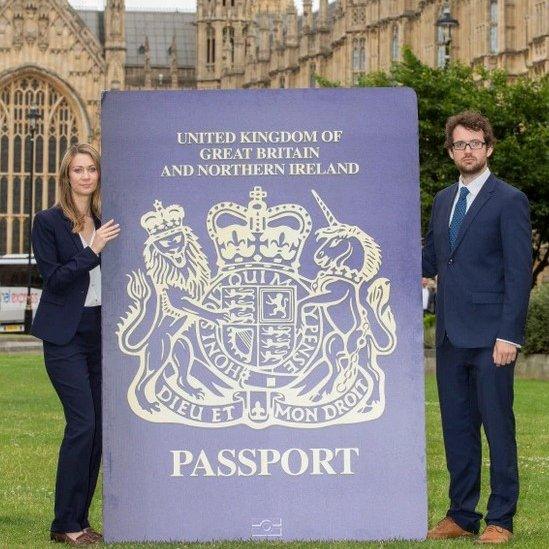
As part of The Sun's campaign to bring back the blue passport it has taken to the streets, external of London with a giant model of how it might look, reporting that it found "Brits only too happy to give the plan their stamp of approval". Should the British passport be blue?
Thursday 4 August
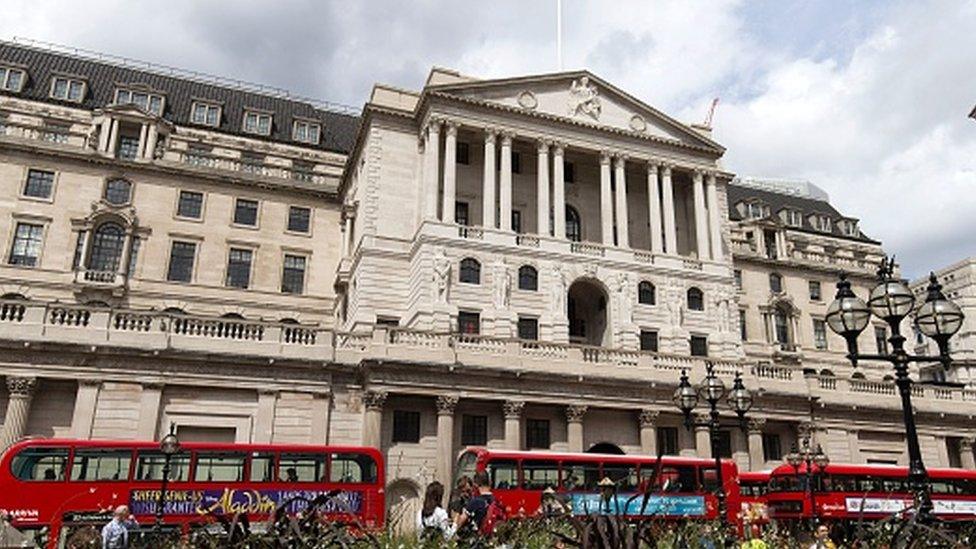
The main event: The Bank of England has cut UK interest rates for the first time since March 2009 from 0.5% to 0.25% - an historic low. It also launched two new schemes: one to buy £10bn of high-grade corporate bonds and another - potentially worth up to £100bn - to ensure banks keep lending even after the cut in interest rates. The Bank faced increasing pressure to act after recent poor economic data. The rate cut is intended to boost the UK economy in the wake of the country's vote to leave the EU - but some analysts see it as a "wasted gesture", saying the main shock from the Brexit vote is "political" and difficult to address through monetary policy.
Also in the news: The National Trust is calling for an overhaul of agricultural subsidies after Brexit, saying farmers should only be paid public subsidies for managing the countryside in a wildlife-friendly way - an idea which has been given short shrift by the National Farmers' Union.
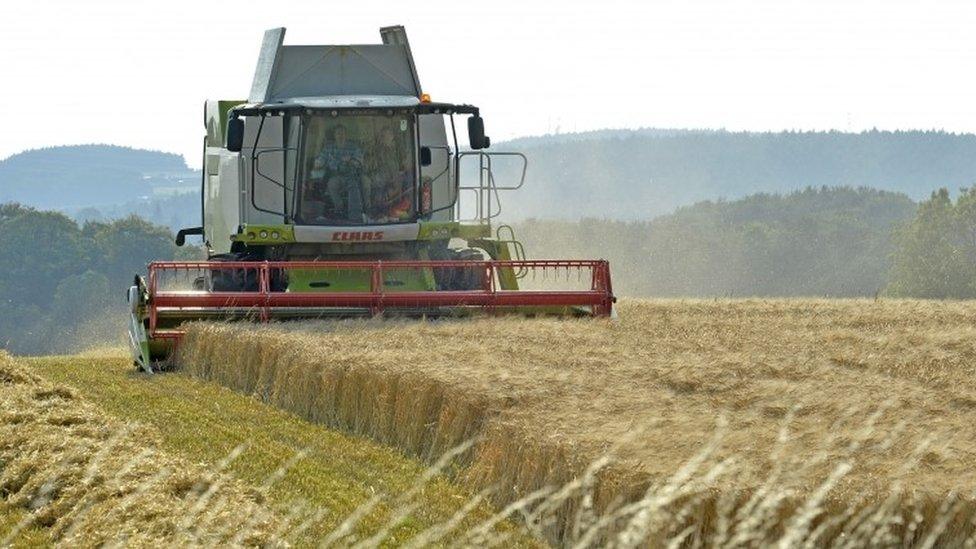
Financial news: All eyes are on the Bank of England's decision to cut interest rates - which saw the value of the pound fall more than 1% against the dollar. The Bank has left its forecast for growth this year steady at 2% but 2017 brings a sharp downgrade to growth of just 0.8%, from a previous estimate of 2.3%. The Bank says the outlook has "weakened markedly" following the referendum vote.
From the papers: The Guardian carries a warning, external that leaving the EU could "kill off" fruit and vegetable production if foreign workers are prevented from coming to the UK. The Financial Times reports pension funds are worried by, external a new round of quantitative easing, which is part of the steps announced by Bank of England to offset a slowdown in growth following the Brexit vote. An editorial in the Telegraph, external argues that UKIP needs to "face up to its responsibilities" and ensure the party is in a position to play an active role in the process by which the UK leaves the EU. And The Times' science correspondent sees tough decisions ahead, external for Environment Secretary Andrea Leadsom, as the powers the UK will regain over farming could "make or break" agriculture.
More reading:
Could Brexit boost UK-China trade? by BBC China Editor Carrie Gracie
Brexit: The Irish dimension, by BBC's The World This Weekend presenter Shaun Ley
UK banks pin Brexit hopes on financial crisis bailout negotiator, Reuters, external
Staffing The "Department for Brexit", Huffington Post, external
And finally...
The Telegraph's energy editor Emily Gosden reported last month that officials are divided over how to pronounce the abbreviation of the new Department for Business, Energy and Industrial Strategy, with staff from what used to be BIS saying "bays" and those from DECC saying "bees". Now Matt Foster of Civil Service World has an update: the FDA union is pronouncing BEIS as "bays". Next task: how to pronounce the shorthand DfEEU (Department for Exiting the EU), or DExEU, as some are calling it.
Wednesday 3 August
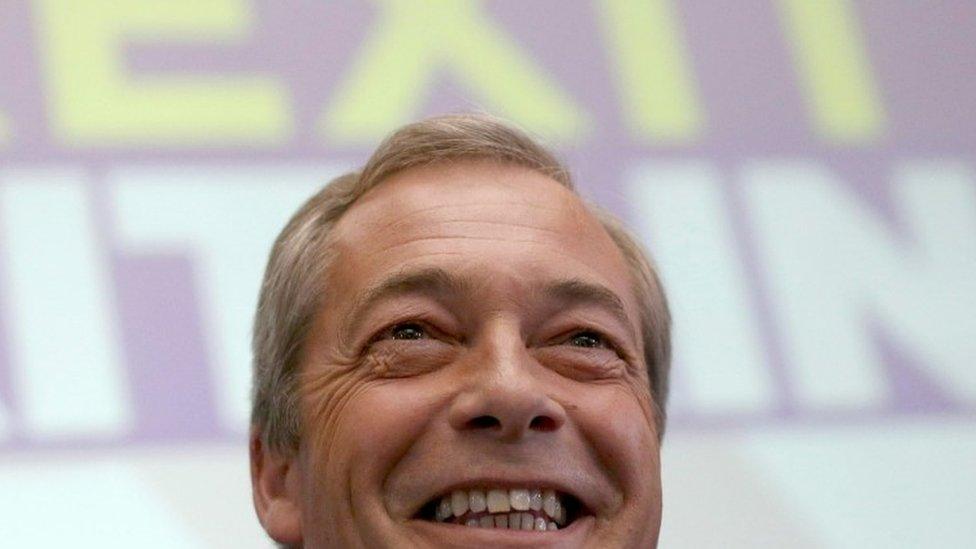
The main event: UKIP, which is looking for a new leader to succeed Nigel Farage, published a list of the candidates that are eligible to stand in the contest. There was immediate controversy after MEP Steven Woolfe, regarded as the frontrunner, was disqualified after he missed the deadline for submitting his application by 17 minutes. Contenders who are going forward after being vetted by UKIP's NEC are: MEPs Diane James, Jonathan Arnott and Bill Etheridge, councillor Lisa Duffy and former parliamentary candidates Elizabeth Jones and Phillip Broughton.
Also in the news: Experts at the Migration Observatory at the University of Oxford have been looking at the existing system for EU migrants applying for permanent residence in the UK to examine possible issues that could arise if it was altered following the Brexit vote. They suggest if all the three million European Economic Area (EEA) citizens living in the UK at the beginning of 2016 applied for permanent residence in the same year, this would amount to the equivalent of about 140 years of work at recent rates of processing.
Financial news: Activity in the services sector saw its sharpest fall in seven years in July, according to the Markit/CIPS purchasing managers' index. Meanwhile, the National Institute of Economic and Social Research is arguing the UK has a 50/50 chance of falling into recession within the next 18 months. The think tank says the country will go through a "marked economic slowdown" this year and next as a "short-term consequence" of the decision to leave the EU. However, its forecasts still suggest the UK will avoid recession, the economy growing by 1.7% in 2016 and 1% in 2017. The FTSE 100 opened at 6630.13 - down slightly on the previous day, but still close to its year high. Meanwhile, the pound was at 1.19 euros (its 52 week high is 1.43 euros, its post Brexit low was 1.16 euros).
From the papers: The Guardian, external says charities fear Brexit will increase demand for their services but imperil their funding. According to the Daily Telegraph, external, as many as 2,000 farmers have been left in limbo after a string of multi-million grant schemes for the countryside were frozen after the Brexit vote. The Times reports, external that investors used fears over Brexit to withdraw £3.5bn from UK managed investment funds in June, dwarfing the worst month in the 2008 financial crisis. The Sun, external says Tory MPs and MEPs are rallying behind its campaign to axe the UK's burgundy passports and reinstate the previous British navy passport design.
More reading:
In the navy? Should UK passport be redesigned on the BBC website
Brexit must mean 'lump it' by Tory MP Nigel Evans in Conservative Home, external
How EU has shaped modern Cornwall in The Independent, external
On the rocks? How the whisky industry, external is reacting to Brexit
And finally...
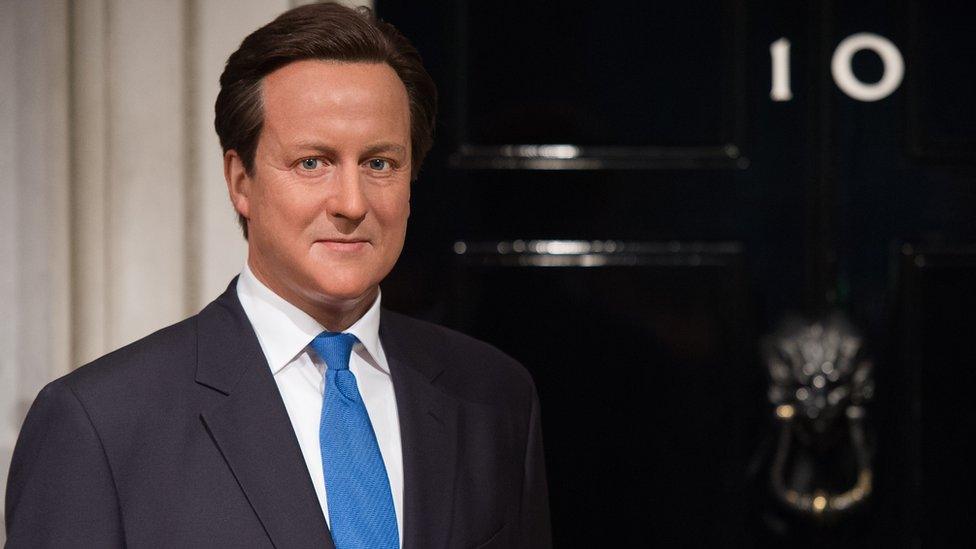
Brexit spelled the end of David Cameron's leadership but now the ex-prime minister appears to have suffered a further indignity - his waxwork image has been removed from display by Madame Tussauds in London. The figure will be kept in storage and will not be immediately replaced by Theresa May in front of its Downing Street display. A spokeswoman told the Mirror its policy was not to display figures of leaders that have not been elected by the public - although it may review this in future.
Tuesday 2 August

Sir Julian King was nominated to replace Lord Hill by former PM David Cameron
The main event: The UK has a new European Commissioner following the resignation of Lord Hill of Oareford, who quit as financial services commissioner after the Brexit vote. Sir Julian King, a career civil servant and former ambassador to France, will spearhead EU co-operation on terrorism, organised crime and cyber-security. It's being seen as a higher-profile role than that which was expected to be conferred on the UK following the decision to leave the EU, and could give an indication of how the Commission sees the future of the UK's cooperation with EU member states.
Also in the news: Theresa May's new cabinet subcommittee met to hold its first talks on how to strengthen the economy in light of the UK's vote to leave the EU. The prime minister has billed it as underlining the importance of "building on the strong fundamentals of the British economy and ensuring that everyone who works hard is able to enjoy wage growth, job security and opportunities to progress". The UK's net contribution to the EU rose last year to almost £200m a week, according to the Office for National Statistics.
Financial news: The UK's construction industry suffered its sharpest downturn in seven years last month, according to a business survey that suggests the economy is at risk of recession after the Brexit vote. The Markit/CIPS UK Construction Purchasing Managers' Index (PMI) inched down to 45.9 in July from 46.0 in June - the lowest reading since June 2009 and some way below the 50 mark that divides growth from contraction. While better than all forecasts in a Reuters poll of economists that pointed to a reading of 43.8, the figures - compiled after the referendum - show commercial construction dwindled and confidence flagged.
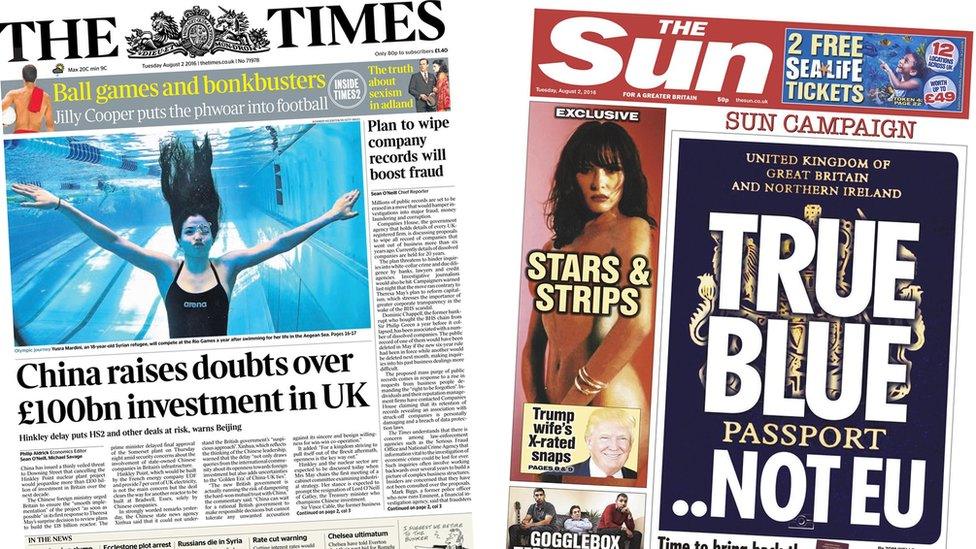
From the papers: The Financial Times, external is predicting that pensions for British officials working in Brussels "are set to be one of the most poisonous parts of Brexit talks", pointing out the typical employee of the EU institutions is entitled to a pension of up to 70% of their basic salary. The Daily Mail has more on Monday's story, external about peers considering moves to delay Brexit, saying No 10 has "slapped down" the idea and the peer who made the suggestion "thinks she knows better than voters". Writing in the Telegraph, external, former Labour MP Alan Milburn describes the Brexit vote as "a demand from voters for more social mobility". The Guardian has a feature on the impact of the referendum on academic research, external, which includes the claim from one scientist that EU colleagues are "worried" about collaborating with their British counterparts.
More reading:
Leaving the EU is actually quite simple, by Jacob Rees-Mogg for Times Red Box, external
Hopes that the UK would shake off Brexit vote now look fanciful, in The Guardian, external
Brexit in the hands of the unbelievers, in Politico, external
How much does each region receive from the EU? FullFact, external
And finally...
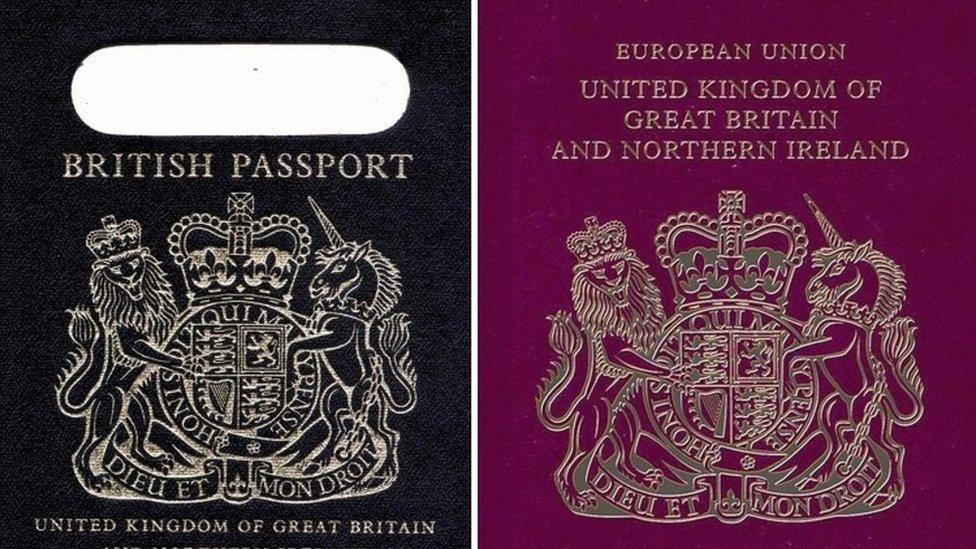
It was what some might have regarded as a side-issue in the referendum: the colour of passports. But The Sun has launched a campaign, external for the UK's official travel documents to revert from maroon to dark blue and lose the words "European Union". The Home Office has already said there are "no immediate plans" to make changes, but if the cause gathers momentum, ministers may have to nail their colours to the mast.
Monday 1 August

Several prominent Remain figures have reportedly been recommended for honours
The main event: The Sunday Times has published details of what it claims is David Cameron's resignation honours list - including prominent Remain campaigners such as Will Straw, head of Stronger In, Tory and Remain campaign donors Ian Taylor and Andrew Cook, and Cabinet ministers Philip Hammond, Michael Fallon, Patrick McLoughlin, and David Lidington. Outgoing UKIP leader Nigel Farage said the list amounted to "rewards for failure", but recently knighted Conservative MP Sir Desmond Swayne said it was right to recognise those who "deserve a little bit more of a thank you than their salary".
Also in the news: A Conservative peer, Baroness Wheatcroft, has raised the idea that a cross-party coalition of Lords could delay or block Article 50, the mechanism for leaving the EU, if Parliament is asked to approve it. And the BBC caught up with fishermen who were part of a pro-Brexit flotilla during the referendum campaign.
Financial news: The UK's manufacturing sector activity fell in July, a survey by Markit/CIPS suggests. The measure of output and new orders fell below the 50 mark that denotes growth for the first time since early 2013. Some analysts have interpreted as evidence that the vote to leave the EU "has added to pressures on the sector", with others advising "it will take time to really understand" the true implications of the decision. Those manufacturing figures sent the pound down 0.2% to $1.32. It had been up 0.1% until the release of the index, and the measure is now at its lowest level since February 2013.
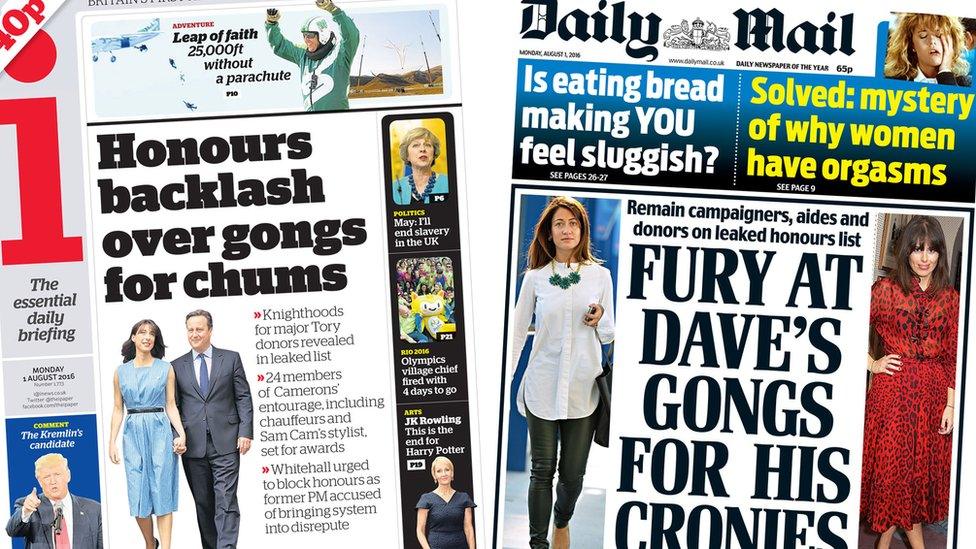
From the papers: Several papers are looking ahead to the meeting of the Bank of England's Monetary Policy Committee on 4 August, with The Guardian talking about a cut in interest rates to 0.25% in an attempt to offset uncertainty associated with the vote to leave the EU and The Financial Times predicting the Bank will downgrade its growth forecast. But The Daily Mail accuses experts of being "doom-mongers" who have "forgotten all the good news".
More reading:
The EU Referendum and the English Reformation - BBC Radio 4's The Long View
How will we decide who can stay? by Jonathan Portes on LSE Brexit Blog, external
Betrayal of the local Brexit voter, by Vernon Bogdanor for Politico, external
Brexit and the challenges of reality, by David Allen Green forThe Financial Times, external
And finally...
European Commission President Jean-Claude Juncker keeps a little black book of grudges, according to an article (in French) in Le Soir, external - and it even has a name, Little Maurice. But a spokesman for Mr Juncker today refused to divulge details to BBC political reporter Adam Fleming, saying: "You will have to ask him if the BBC is in it."
Friday 29 July
The main event: All eyes are on the surprise delay in the Hinkley Point C agreement, which is only Brexit-related insofar as the referendum ushered in a change of prime minister.
Also in the news: Willie Walsh, chief executive of British Airways owner IAG, has played down the impact of the UK's vote to leave the EU, saying he firmly believed "business will settle down" in the wake of the referendum. That's despite BA and IAG reporting that currency movements cost it €148m (£124m) in the latest quarter of trading, mainly due to the weak pound. High-profile London estate agency Foxtons has announced a 42% fall in profits, blaming uncertainty around the EU referendum for the fall. Earlier this week the UK's biggest building society, the Nationwide, said that the Brexit effect on the property market and house prices could take months to become clear. Following a written question from Conservative Lord Blencathra asking if UK passports will be changed from maroon to blue and remove the words "European Union" from the cover, the Home Office has said "there are no immediate plans" to alter its appearance.
Financial news: The FTSE 100 closed at 6,724 - up just 3 points, helped by strong trade in shares in financial companies. Growth in the eurozone slowed in the second quarter to 0.3%, official EU data showed on Friday, with analysts warning that the consequences of Brexit could harm the economy later in the year.
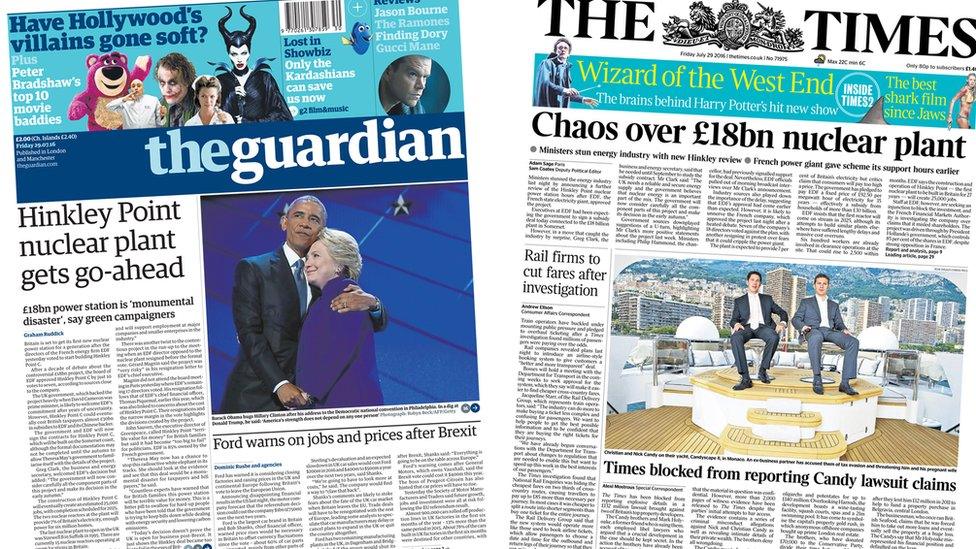
From the papers: The Guardian reports, external Ford is considering closing factories and raising prices in the UK. The Financial Times gives top billing to its analysis, external that the referendum is creating a stark divide between "winners and losers", with exporters and producers of essentials seeing a lift, and importers and discretionary spending hit. The Daily Mail is critical, external of Lloyds' chief executive Antonio Horta Osario's warning that Brexit could slow growth - saying it was "entirely unconnected" to the job losses announced on Thursday. In the Telegraph, Allister Heath writes, external of the need to "energise our economy", recommending the halving of stamp duty, a green light to airport expansion and tax cuts for entrepreneurs. And in The Times, external, Ed Conway foresees a "Brexit lobbying boom", warning that it will take a "superhuman effort" not to let big business rule the roost.
More reading:
What is a customs union? by BBC Reality Check
Post-Brexit rebound in UK stocks comes with a red flag in The Financial Times, external
Four surprising facts about Leave voters in The New Statesman, external
Don't listen to the fearmongers: our Brexit negotiations are in safe hands, Conservative MEP Syed Kamall in The Guardian, external
And finally...
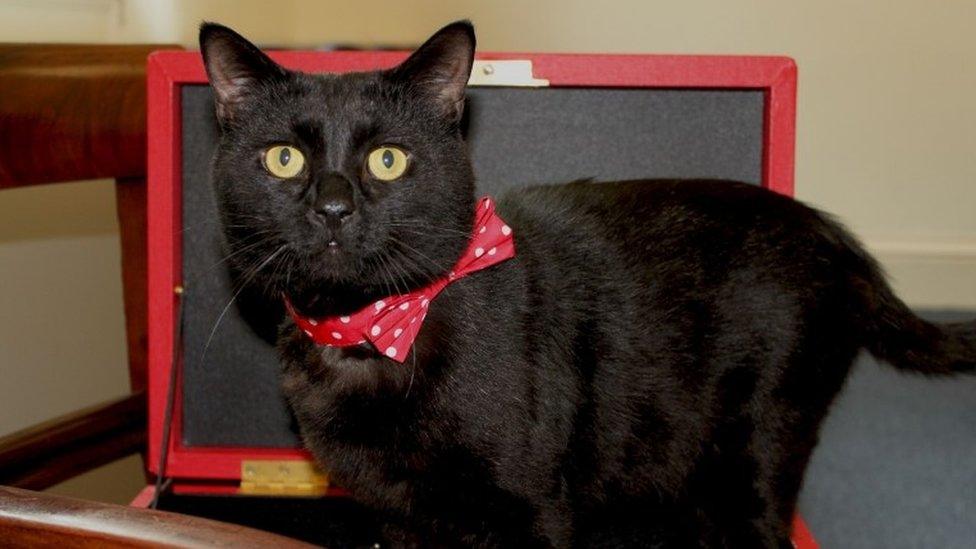
The Treasury has got a new cat - named Gladstone - to rival Larry, of No 10 Downing Street, and Palmerston, who is on mouse patrol at the Foreign Office.
BuzzFeed News reports that the announcement of the latest feline enforcer was scheduled for immediately after the referendum but was pushed back after voters decided the UK should leave the EU.
Thursday 28 July
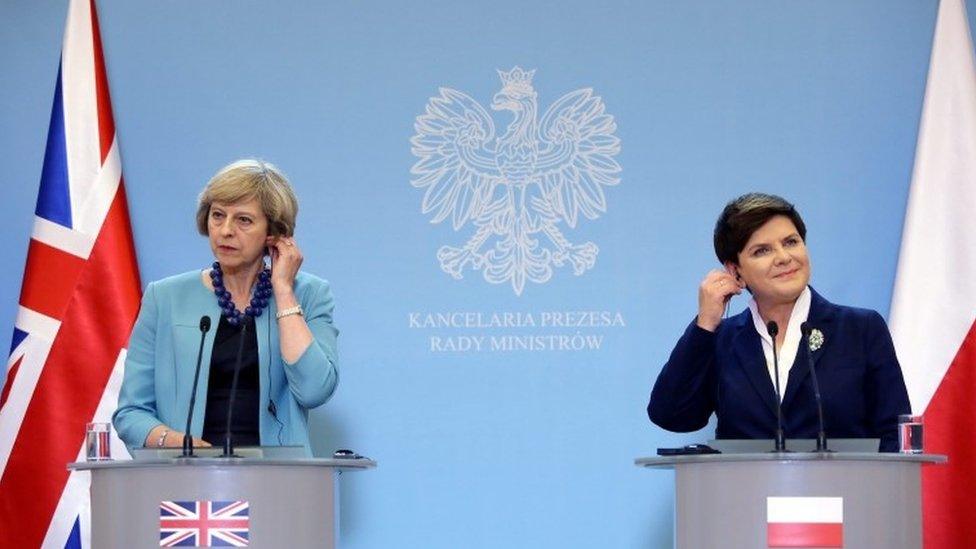
Theresa May with Polish PM Beata Szydlo
The main event: Theresa May embarked on the next leg of her European tour, taking in Bratislava and Warsaw. Her discussions with Slovakian counterpart Robert Fico and Polish Prime Minister Beata Szydlo are among the toughest she has had yet, given the priority attached by the two countries to maintaining free movement of labour between the EU and the UK. Since Poland joined the EU in 2004, hundred of thousands have moved to Britain, either temporarily or permanently, and Poles in the UK send back several billion pounds a year to their home country. Mrs May maintained any future deal would have to take into account "a clear message" from the Brexit vote over immigration control.
Lloyds axes 3,000 jobs: Lloyds has announced it will cut 3,000 jobs and 200 branches - partly due to changes in the way people carry out their banking, but also in expectation of a "deceleration of growth" following the UK's decision to leave the EU. That sounds like it might be what some are calling a #Brexcuse - blaming bad news on the EU referendum result.
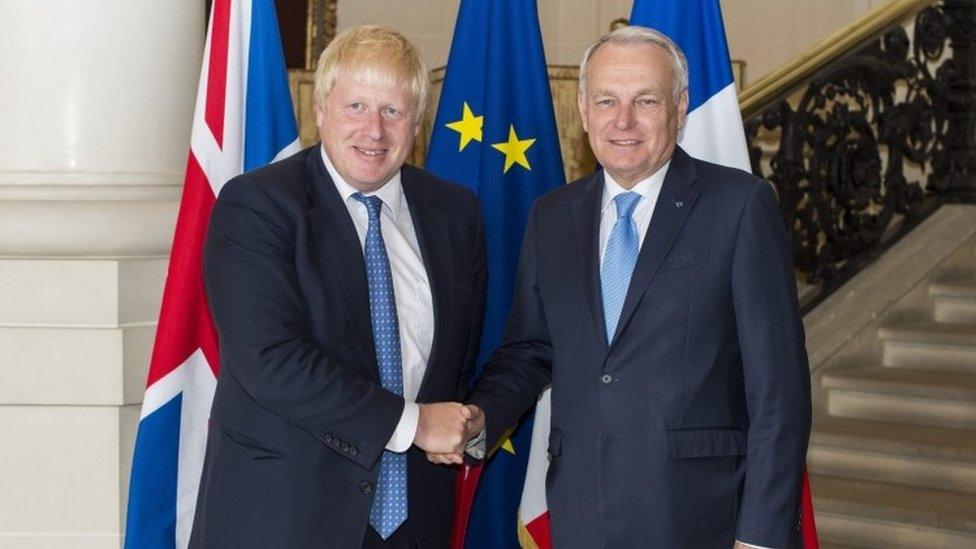
Also in the news: Foreign Secretary Boris Johnson is in Paris meeting French foreign minister Jean-Marc Ayrault. Relations between the two have not been exactly cordial so far, with Mr Ayrault criticising the appointment of his opposite number on the grounds he "lied" during the referendum campaign. Although the technicalities of the Brexit process are not officially part of Mr Johnson's portfolio - he said he hopes the UK will "be as close as possible to" France after the vote to leave the EU and that the two would work together "as friends and allies".
Financial news: The FTSE 100 closed 0.4% lower at 6,721, hurt by a 4% fall in shares in Lloyds Banking Group. Lloyds' shares dipped with the news it is cutting jobs, partly in anticipation of slower growth after the Brexit vote, while Sky's shares were up 6%, with group chief executive Jeremy Darroch saying the Brexit vote "doesn't really change our thinking on any of our markets". The Society of Motor Manufacturers and Traders (SMMT) says UK car production jumped more than 10% year-on-year in June, but warns future growth may be hit if the government does not maintain unrestricted access to the single market. One index of consumer confidence measured by YouGov for the Centre for Economics and Business Research (CEBR) sank nearly five points to 106.6 in July - matching its biggest fall in six years. YouGov said the "public is still absorbing" the EU referendum result but it is "clear that consumer confidence has taken a significant dive".
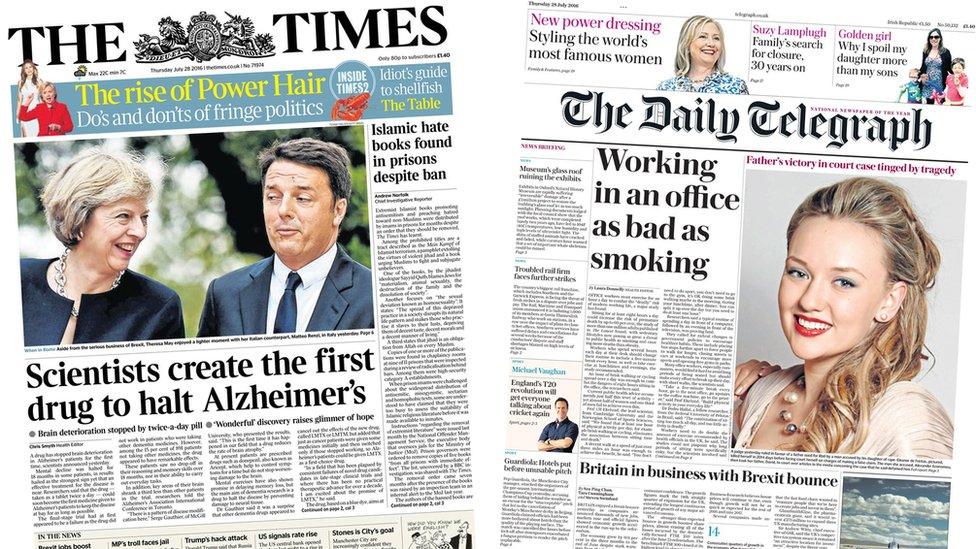
From the papers: The Times warns against, external "self-fulfilling prophecies of doom" on the economy, pointing out that the picture going into Brexit was one of "unusually good health". Writing in the Telegraph, external, Ambrose Evans-Pritchard says the age of fiscal restraint is over, and governments in Europe and beyond are using Brexit as an "excuse" to let rip with stimulus measures. The Financial Times reports, external that European executives in the UK and EU-based British businesspeople are being offered "Brexit insurance" by the firm AIG. And the Daily Mail takes a dim view of the new lead Brexit negotiator for the European Commission Michel Barnier, calling him an "inflexible, anti-British, arch-federalist", external whose appointment was "calculated to poison talks" with the UK.
More reading:
Brexit brings old foes back into battle: George Parker and Alex Barker in The Financial Times, external
In defence of David Cameron: Emily Sheffield in The Spectator, external
Theresa May and her six-pack of difficult deals: Charles Grant, Centre for European Reform, external blog
And finally...
Boris Johnson addressed the French foreign ministry En Francais, and made a decent fist of it. That may stand him in good stead later on, since the Times reports, external that Michel Barnier "insists on conducting all his negotiations in French". Still, it could be worse. Paul Cambon, French ambassador in London 1898-1920, is described in Christopher Clark's book The Sleepwalkers: "[He] spoke not a word of English. During his meetings with [Foreign Secretary] Edward Grey (who spoke no French), he insisted every utterance be translated into French, including easily recognized words such as 'yes'. He firmly believed - like many members of the French elite - that French was the only language capable of articulating rational thought."
Boris Johnson message to the French (in French)
Wednesday 27 July
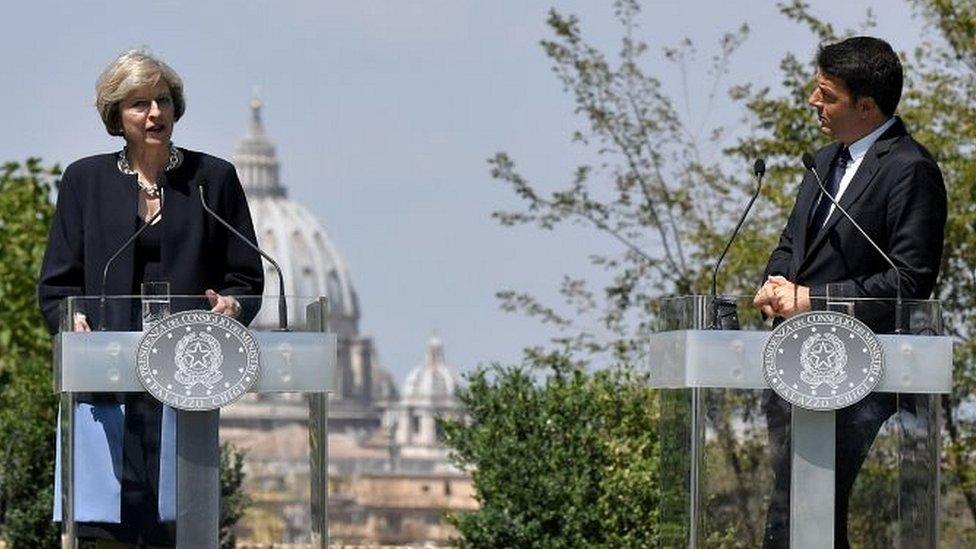
The main event: Prime Minister Theresa May has continued her series of meetings with other EU leaders, heading to Italy for talks with PM Matteo Renzi. There, she said she retained an "open mind" about the UK's trading relationships after Brexit amid reports some cabinet colleagues want the UK to pull out of the EU's customs union. Mr Renzi said the UK's vote to leave the EU was sad, but he hoped "some good would come of it". Mrs May's visit follows Downing Street talks on Tuesday with Enda Kenny and last week's meetings with Angela Merkel and Francois Hollande.
EC names Brexit negotiator: Michel Barnier, a former French minister and ex-European Commission vice president, has been appointed as the commission's chief Brexit negotiator, by Jean-Claude Juncker. Mr Juncker said he wanted "an experienced politician for this difficult job". Mr Barnier will take up his position on 1 October. He will not necessarily be the European Union's chief negotiator as the European Council looks set to head-up negotiations, with Belgian diplomat Didier Seeuws leading their preparations, while the European Parliament will also seek to take the lead at some stages.
Also in the news: MPs on the Home Affairs committee warn in a report that there could be a spike in migration ahead of Brexit. They call for the government to give an "effective cut-off date" after which EU citizens moving to the UK do not have the automatic right to stay. The "most obvious" cut-off dates they suggest, external include the referendum day itself - June 23 - the date when the UK triggers the two year Article 50 process of leaving the EU, which will be early 2017 at the earliest, or the date when the UK actually leaves the EU.
Financial news: Lots today. The Office for National Statistics released economic growth figures for the second quarter of the year. They show that growth was 0.6%, external, higher than 0.4% in the first quarter, and higher than expected. The figures appear to show uncertainty ahead of the referendum had "limited", if any, impact on growth. Meanwhile GlaxoSmithKline is to invest £275m to expand its UK manufacturing sites, saying the country remains "an attractive location" despite Brexit. The news is particularly interesting given the firm had warned ahead of the referendum of the impact a Brexit vote would have. The FTSE 100 index was up slightly on the GDP news, to 6749.12 at 16:00 BST, so once again nudging its high point of the last year. The pound was at 1.19 euros (its 52 week high is 1.43 euros, its post Brexit low was 1.16 euros).
From the papers
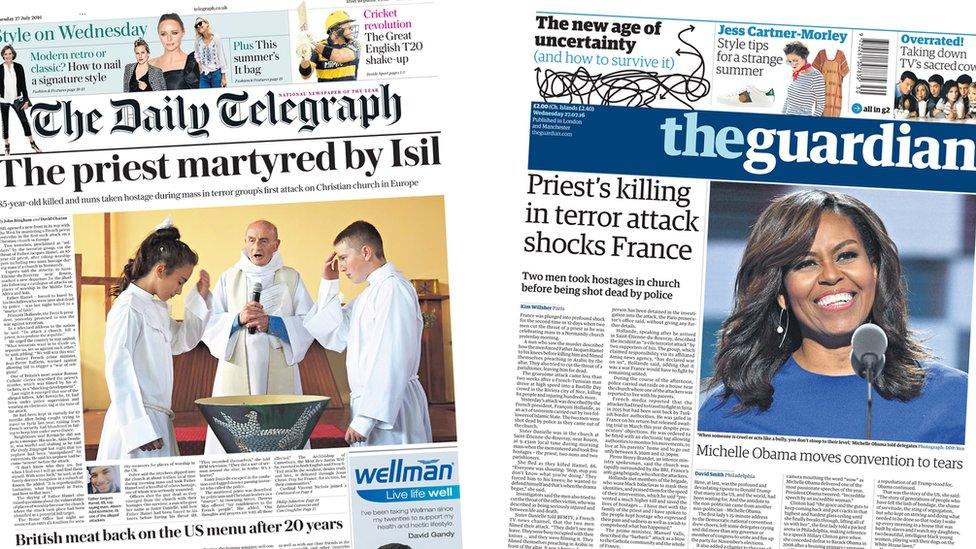
The Financial Times leads on International Trade Secretary Liam Fox wanting the UK to quit the EU customs union, external so that he has maximum freedom to negotiate new trade deals around the world - the FT quotes him as saying he was "scoping out about a dozen free trade deals outside the EU to be ready for when we leave". The Daily Telegraph says that Brexit could lead to BT being broken up because regulator Ofcom would have more powers.
More reading:
Brexit: Statistics show old and ignorant not to blame: Gary Bennett Conservativehome, external
Bank warned against using 'sledgehammer': Jeremy Warner in The Daily Telegraph, external
Liam Fox will hand post-EU control to big business: George Monbiot in The Guardian, external
Steven Woolfe says as UKIP leader he won't tolerate watered-down Brexit: HeatStreet, external
Blame it on the Brexit: But is it just an excuse?: Alex Ritson, BBC News
And finally...
We already know that there are going to be plenty of Brexit-related jobs created - for example trade negotiators - but one that caught our eye today was from NHS England for someone to be Head of its EU Transition Team "a new unit to manage the impact of the NHS of leaving the European Union".
Tuesday 26 July
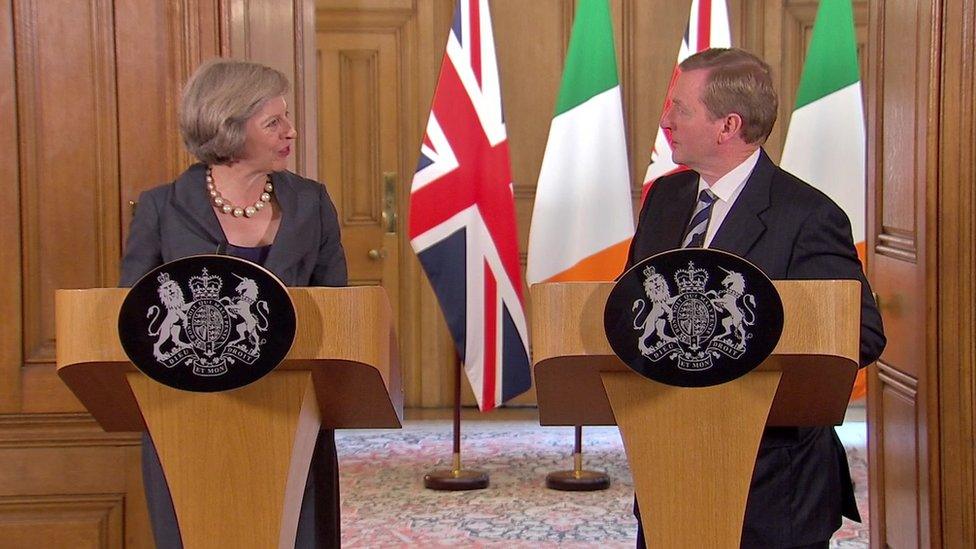
The main event: There are no answers yet on what will happen to the border between the Republic of Ireland and Northern Ireland when the UK leaves the EU, but diplomatic overtures continue with Theresa May hosting Irish Taoiseach Enda Kenny at Downing Street. She said they were in agreement that Ireland and the UK "want to maintain the closest possible economic relationship". Mr Kenny said Brexit "was not the outcome we in Ireland wanted" but expressed hope the UK would remain "outward-looking".
Also in the news: There were widespread calls for action in June after figures showed a rise in reported racist incidents following the referendum - and now Home Secretary Amber Rudd has announced a review of how the police handle hate crime. Another consequence of the Brexit vote was Nigel Farage's decision to step down as UKIP leader. The contest to succeed him showed signs of livening up, with Suzanne Evans ruling herself out with a pledge to back councillor Lisa Duffy - and MEP Steven Woolfe heading to Manchester for his first big speech.
Financial news: No relevant financial data released. London's FTSE 100 index ended almost 14 points higher at 6,724.7 - well up on its immediate post-referendum level and approaching its highest of the past year. The FTSE 250 was up to 17,108, about 13% above its June low and back to average levels for the past year. Most papers carry the news that Ryanair plans to "pivot" investment away from the UK by cutting frequency of flights on some routes.
From the papers
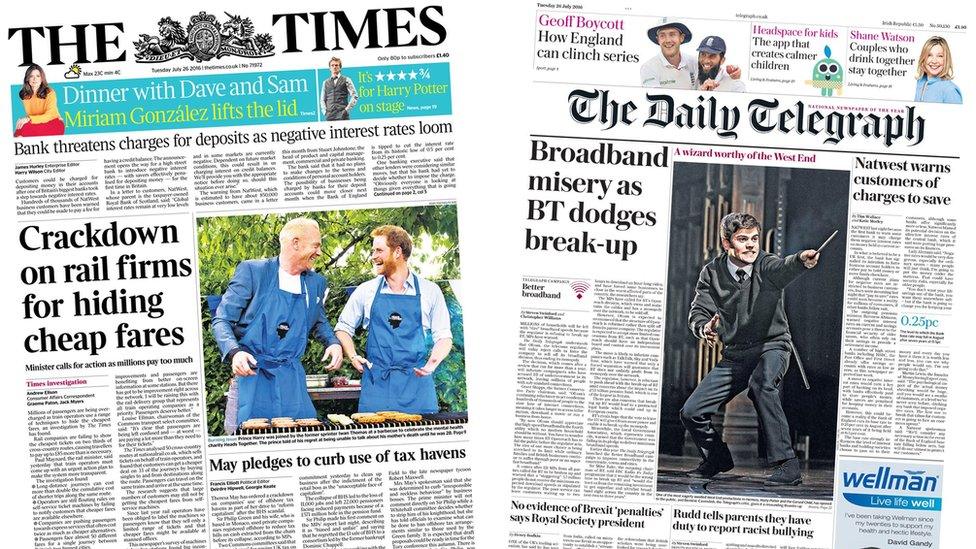
Martin Weale from the Bank of England's interest rate-setting committee, the MPC, has spoken out in favour of a stimulus package - which, according to the Financial Times, external, "all but guarantees" the bank will announce one at its meeting on 4 August.Forget any "emergency Budget" - the new chancellor is unlikely to make a significant announcement until November, as it will be difficult to read the economic runes cast by the referendum before then, advises Paul Johnson of the Institute for Fiscal Studies in The Times. The Daily Telegraph, external and others report on the views of the president of the Royal Society, Sir Venki Ramakrishnan, who says he has seen no evidence UK researchers are being overlooked for EU funding in the wake of the referendum, and the UK's attractiveness to international academics is "not going to change". Reuters reports, external Liam Fox, the new international trade minister, got a lukewarm reception in Washington DC, where US counterpart Michael Froman warned of no "meaningful advance" US-UK trade negotiations until "basic issues around the future EU-UK relationship have been worked out".
More reading:
If May goes soft on Brexit there'll be a revolt: Melanie Phillips in The Times, external
How federalists tried to kill the EU exit clause on Reuters, external
A pro-enterprise future is vital for UK: William Hague in The Daily Telegraph, external
Catch-up with the EU referendum results in maps and charts
And finally... The Times' Red Box caught up with, external Brexit backer Conservative Tim Loughton today, and snapped (sorry) this excellent picture.
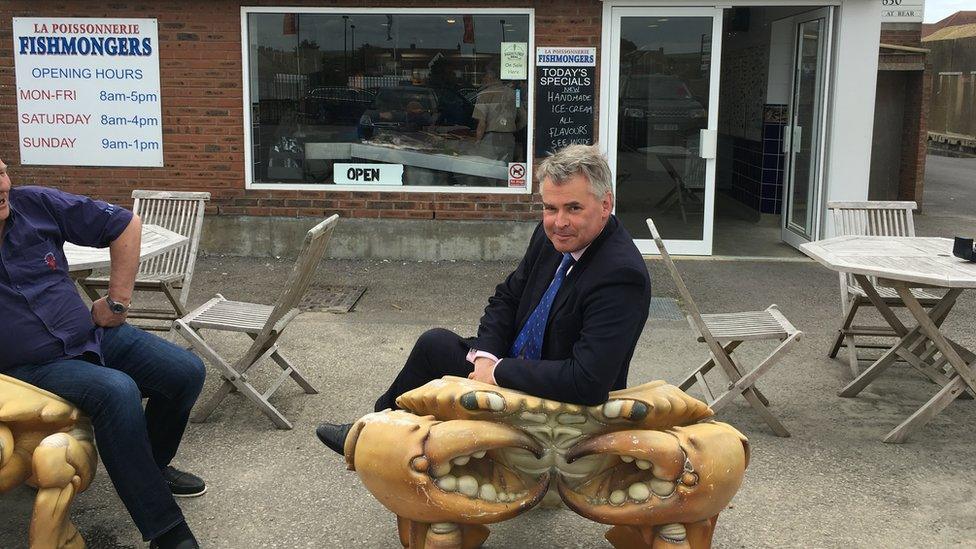
Monday 25 July
The main event: Theresa May paid her first visit to Northern Ireland as prime minister, where she met First Minister Arlene Foster and Deputy First Minister Martin McGuinness to discuss issues facing the country following the referendum result. She said their talks were "positive and constructive". The key issue was what happens to the border between Northern Ireland the Republic of Ireland after Brexit. Mrs May said: "No-one wants to return to borders of the past."
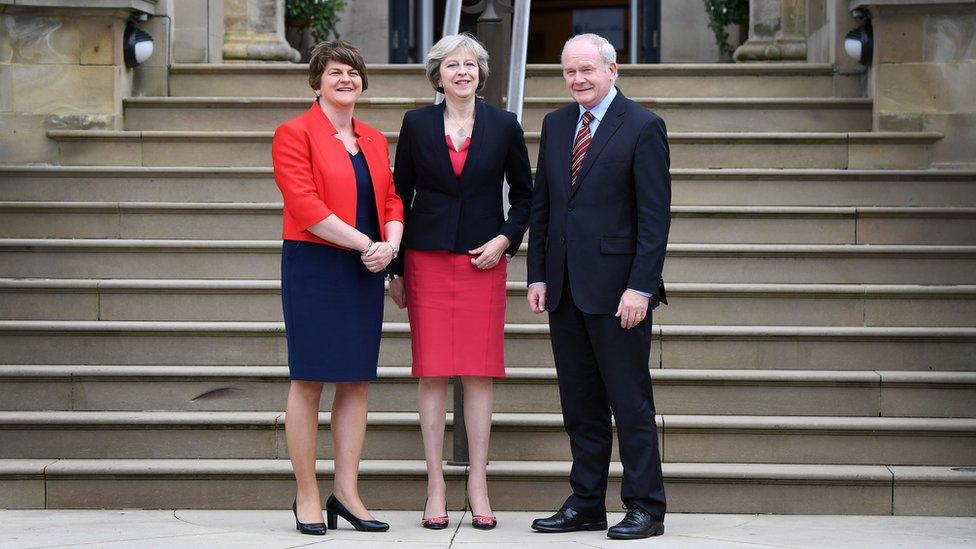
Also making the news: Scottish First Minister Nicola Sturgeon spoke about the future of the UK and the EU, saying it was in the UK government's interest to help find a solution short of a second independence poll -"or we can consider again the option of independence".
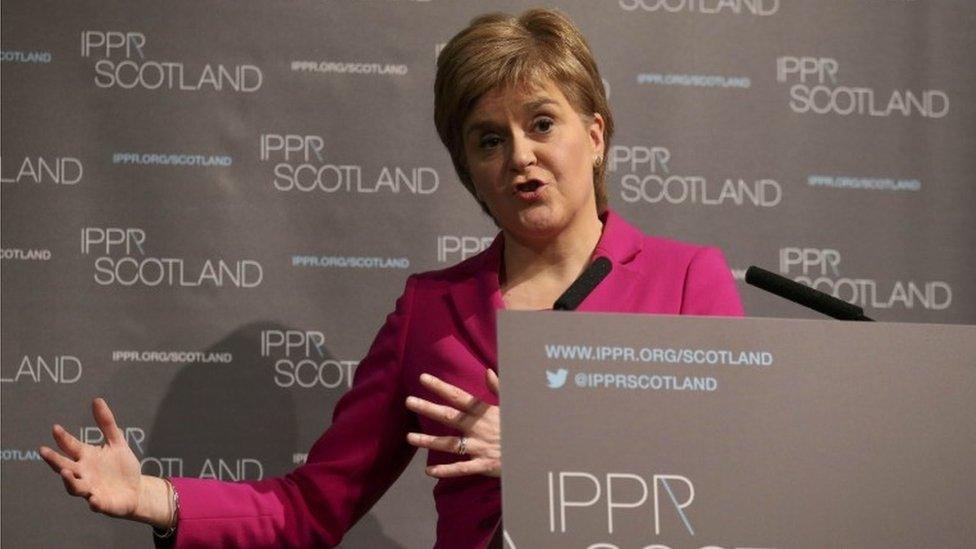
At a speech in Edinburgh Nicola Sturgeon called the lack of planning for the eventuality of a Brexit vote "one of the most shameful abdications of responsibility in modern political history"
Financial news: London's main share index was lower on Monday morning, while other major European markets saw gains. Shares had been in positive territory until publication of the CBI's latest industrial trends survey, which suggested Brexit was hitting business confidence. The Financial Times reported that billions of euros have been pulled out of investment funds, external since the UK voted to leave the EU, although some analysts say this could just be an initial knee-jerk response.
From the papers: What the commentators say: Roger Bootle of Capital Economics, writing in the Telegraph, external, is bullish about the UK's financial outlook, saying "alarmist views have proved unjustified" - with the equity market "stabilised" and the fall of sterling "of net benefit to the economy overall". Ian King in the Times asks whether Philip Hammond's courtship of Chinese investment could create the potential for clashes at Downing Street, external, saying Theresa May has been far more "sceptical" about inviting Chinese involvement in UK projects. The Guardian's Larry Elliott assesses some options, external for an "economic reboot", including quantitative easing or loosening credit controls - "something governments need to have up their sleeves when time gets tough".
And finally... EU Commission president Jean-Claude Juncker on Foreign Secretary Boris Johnson, who once compared the EU to Nazis: "I haven't met him, but I would love to, so that I can persuade him that there is more separating myself and Hitler than just a nuance."